On The Move


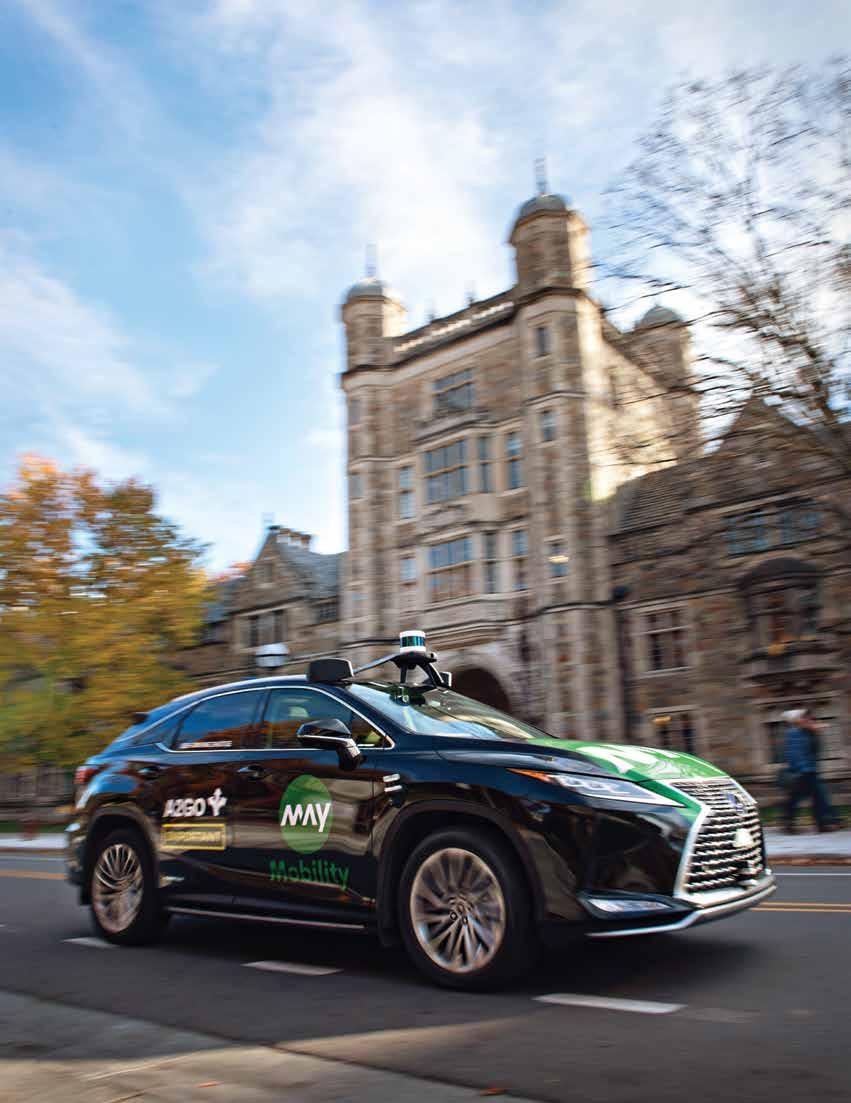

Professor Michael Steinberg hosted TA1LS, a new event in which 1L public interest students came together to share their stories of coming to law school. In this photo, Collin Christner, who completed his undergraduate studies at Stanford, addresses the group.

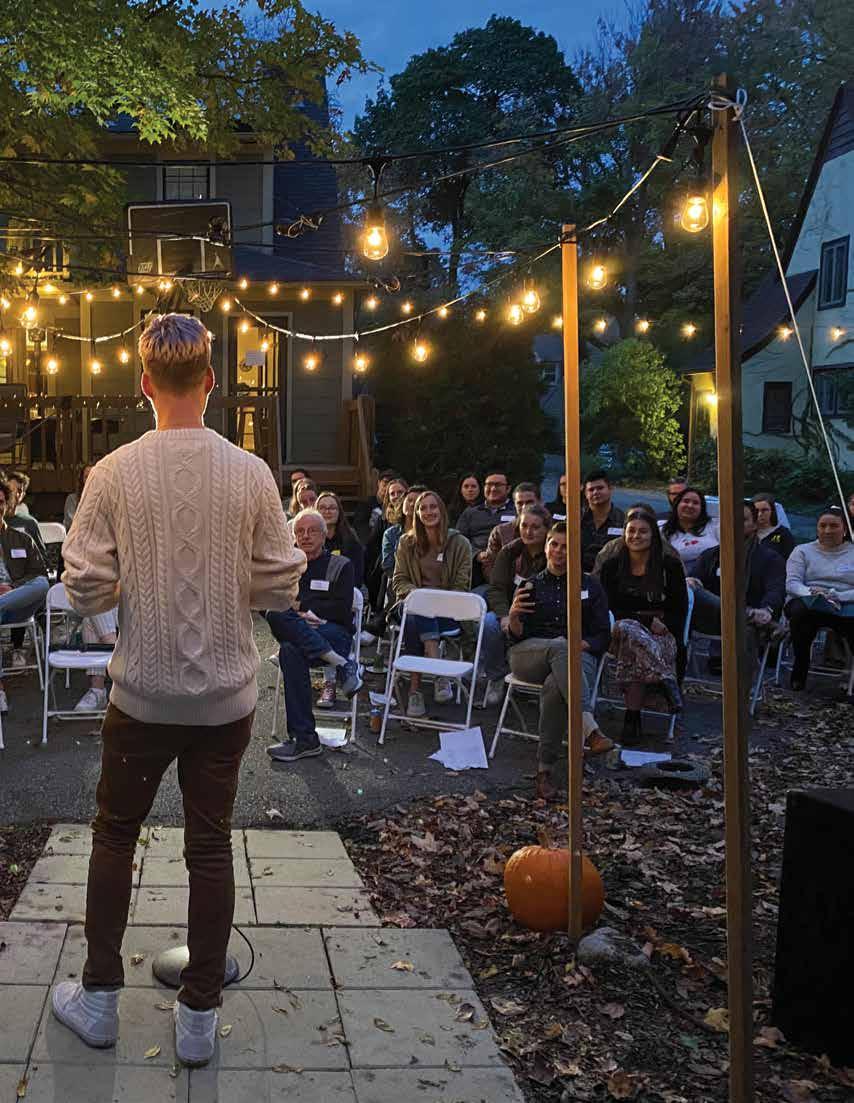
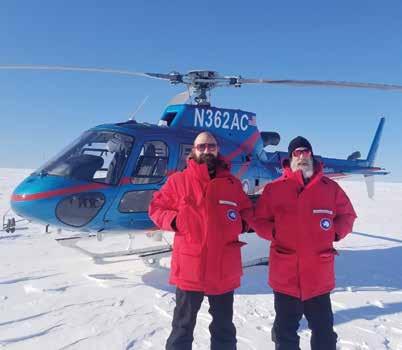
IN PRACTICE LAW AT THE BOTTOM OF THE EARTH SCORING A WIN FOR STUDENT-ATHLETES 10 ON THE MOVE: MOBILITY AT MICHIGAN LAW “ There are all kinds of good reasons to think that this mobility revolution is something that we should be encouraging…” 06 BRIEFS 22 @UMICHLAW FAC ULTY NEWS DESIGNING A FULFILLING LIFE IN LAW PRO BONO PROGRAM ENVIRONMENTAL LAW 12 16
Law
DANIEL CRANE, the Frederick Paul Furth Sr. Professor of
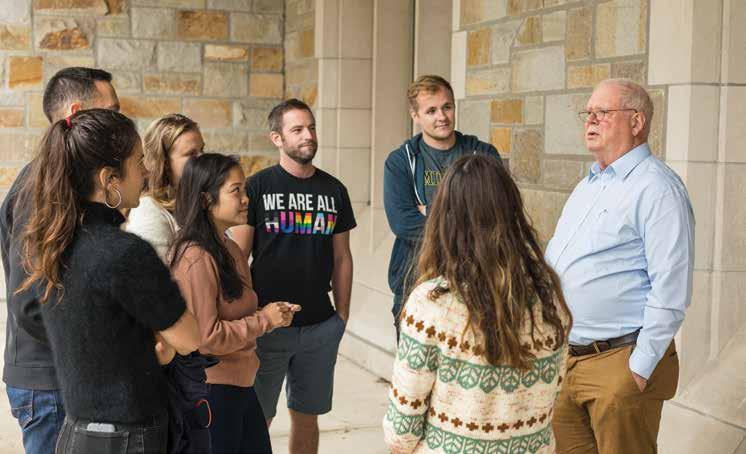
43 REMEMBERING FACULTY DEAN TERRANCE SANDALOW 28 ZELL ENTREPRENEURSHIP CLINIC IMPACT PHILANTHROPY AT MICHIGAN LAW 36 CLASS NOTES HERB KOHN, ‘63 LIZA YNTEMA, ‘84 30
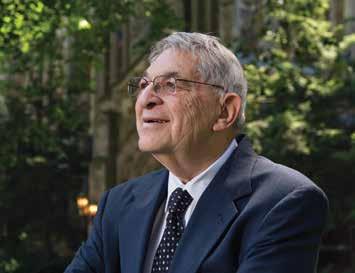

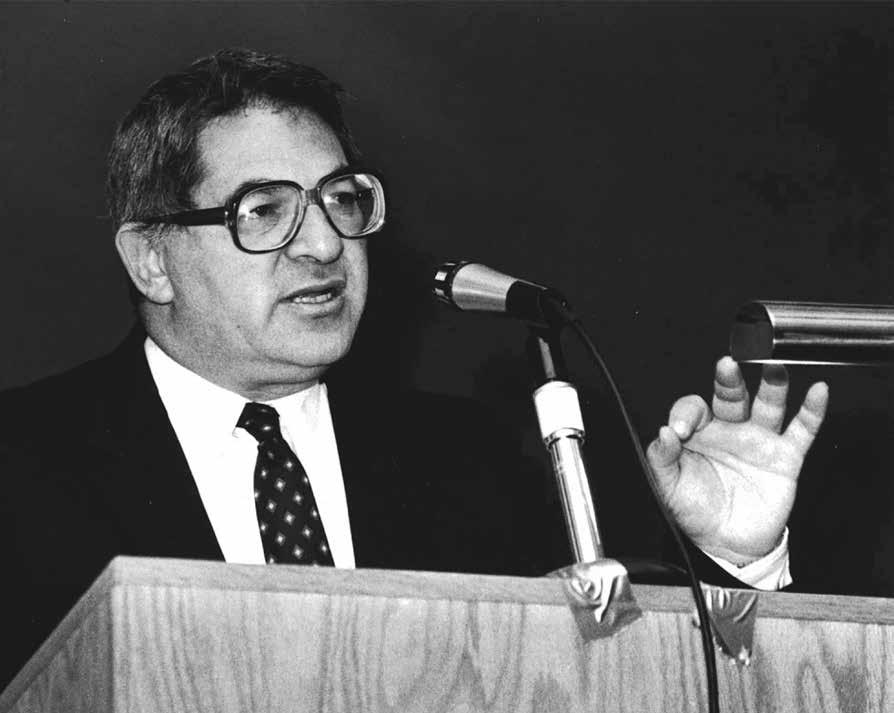
REMEMBERING FACULTY DOUG KAHN REMEMBERING FACULTY YALE KAMISAR 44 45
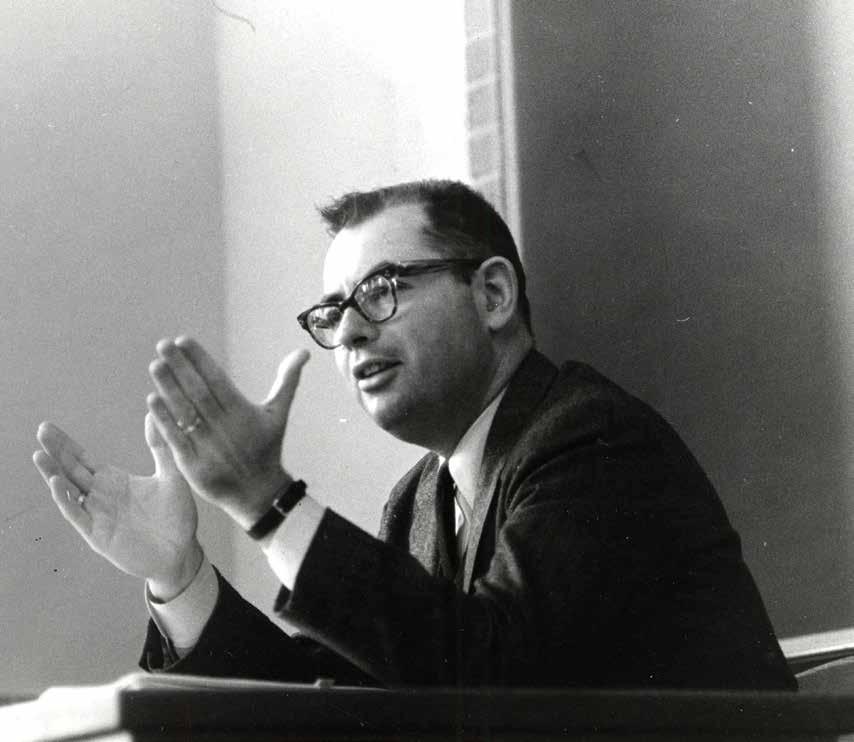
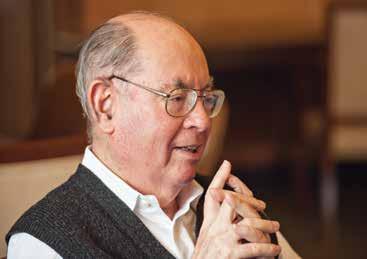
46 IN MEMORIAM THE HON. AVERN COHN, ’49 48 CLOSING THE CREASE COURT
Daniel Halberstam, the Eric Stein Collegiate Professor of Law, saved his toughest question for last in discussion with Latvian President Egils Levits during a panel co-hosted by the Law School and the U-M Weiser Center for Europe and Eurasia.
Geneviève Zubrzycki, U-M professor of sociology and director of the center, also participated in the wide-ranging discussion about Latvia and related geopolitical issues.
(For those wondering, the president suggested Latvian prospects were on the rise and that it was likely to win Eurovision within three years.)
CELEBRATING JUSTICE
In fall 2021, the Michigan Innocence Clinic held an event in the Law Quad to celebrate four clients who were recently released from prison. The clients were joined by their friends and families, as well as by current and former students who were involved in securing their release. The event celebrated Tonia Miller, Walter Forbes, Kevin Harrington, and Eric Anderson. Miller, who was wrongfully convicted of murder in the 2003 death of her daughter, was released in April 2021 based on a new scientific understanding of medical issues related to so-called shaken baby syndrome (her baby is now believed to have died from pneumonia). Forbes was exonerated in 2020 after a key witness admitted to lying in the 1983 murder and arson trial. Harrington was released in 2020 after serving 17 years, following the clinic’s discovery of new evidence that exonerated Harrington and revealed the correct identity of the murderer. Anderson, wrongfully convicted of armed robbery, assault, and felony firearms charges, was exonerated in April 2019 when the true perpetrator confessed to committing the crime with someone other than Anderson. Another client, Juwan Deering, also attended the event; he was freed in September 2021 after a judge dismissed his 2006 murder conviction, citing police and prosecutor misconduct. Deering’s exoneration will be formally celebrated at a separate event for him and other new exonerees that will take place in 2022. The Michigan Innocence Clinic has assisted in the release of 29 clients since it was established in 2009.
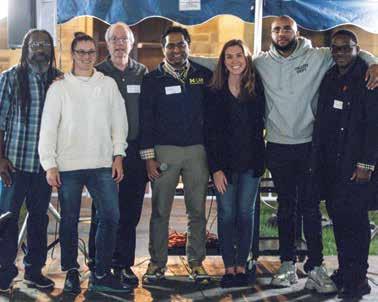
BRIEFS 6 Law Quadrangle • Winter 2022
“I have one last question about a subject that must keep you up at night. It’s been 20 long years now since Latvia won the Eurovision Song Contest. When will Latvia win it next, and what will you do to help bring it about?”
Zoom Court?
“According to the National Center for State Courts, this country’s first court-connected [online dispute resolution] system did not launch until 2014, which is when the 14A District Court in Washtenaw County, Michigan, began piloting a platform to resolve certain traffic offenses. Its system was developed by Michigan-based Court Innovations Inc., which calls its ODR platform Matterhorn and was founded by University of Michigan law professor J.J. Prescott. Other courts started to slowly add ODR programs in the subsequent years, but there were still only 19 sites by the end of 2017, and most were in Michigan, according to an ABA Center for Innovation report released last year. Experts credit Court Innovations Inc. and forward-thinking court leaders for Michigan’s early leadership in ODR.”
The work of J.J. Prescott, the Henry King Ransom Professor of Law, was prominently featured in an ABA Journal article, “Lawyers and Judges Optional? Online dispute resolution promises to increase access to justice, but challenges remain.”
Class of ’24 Sets a High Bar 7,693
Applications received during the 2020–2021 admissions cycle, the most in Law School history.
38.2%
For more about the courts adapting to new technology, revisit last issue’s cover story on how the pandemic has helped motivate the judiciary to adopt new technology at quadrangle.law. umich.edu/spring2021
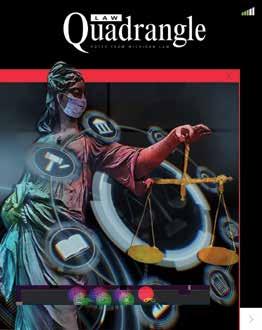
Yield on offers to enroll, the highest ever. The previous high of 35% was set in 2019–2020.
171
Median LSAT score, the highest ever.
3.84
Median undergraduate GPA, the highest ever.
BRIEFS 7 Law Quadrangle • Winter 2022
The number of students who participated in the Pro Bono Program during the 2020–2021 academic year, the highest number of participants in Law School history. Read more about the Pro Bono Program on page 26.
232“CHILDREN CANNOT BE PROTECTED FROM SEXUAL EXPLOITATION AS LONG AS PORNOGRAPHY IS PROTECTED AND PROSTITUTION OF ADULTS IS TOLERATED, BECAUSE THESE ARE THE SAME GROUP OF PEOPLE AT TWO POINTS IN TIME, SOMETIMES NO MORE THAN ONE DAY APART, SOMETIMES AT ONE AND THE SAME TIME—CHILDREN PRESENTED AS ADULTS, ADULTS PRESENTED AS CHILDREN.”
From “OnlyFans Is Not a Safe Place for ‘Sex Work’” by Catherine MacKinnon, the Elizabeth A. Long Professor of Law, published in the op-ed section of The New York Times The piece was in response to an announcement from OnlyFans, a subscription-based social media platform, in which the company backtracked on a previously-announced policy that would have banned sexually explicit content.
“The constitutionality of S.51 is straightforward. The admission clause of Article 4 Section 3 empowers Congress to admit new states, subject only to the limitation that Congress cannot unilaterally reconfigure any existing states. S.51 would not reconfigure any existing state; it would simply take American territory that is not currently a state and make it one. That’s exactly what the admission clause empowers Congress to do. Some say that this admission would require a constitutional amendment, but the Constitution doesn’t say that. The Constitution gives the power to admit new states to Congress, not jointly to Congress and state legislatures by way of constitutional amendment…It’s true, the founding generation didn’t intend Washington D.C. to be a state, but the founding generation also didn’t intend to create a situation in which 700,000 Americans would have no voting representation in Congress. For the founders, no principle was more central to the Constitution than representative government. In their time, there was no conflict between that principle and the non-state status of Washington D.C., because virtually nobody lived in Washington, D.C. But today, it is a conflict.”
Richard Primus, the Theodore J. St. Antoine Collegiate Professor of Law, during remote testimony before the U.S. Senate Committee on Homeland Security and Governmental Affairs. The hearing was convened to discuss S.51, a bill that “provides for admission into the United States of the state of Washington, Douglass Commonwealth, composed of most of the territory of the District of Columbia.” The bill would admit the state on equal footing with all other U.S. states.

8 BRIEFS
Law Quadrangle • Winter 2022
HONORABLE ALUMNAE
The Black Law Students Association hosted alumni and students in the Law Quad in celebration of two alumnae who assumed judgeships during the pandemic. The Hon. Erane Washington (pictured, left), ’93, was elected to the bench in Michigan’s 14B District Court, and the Hon. Miriam Perry (pictured, right), ’98, of the 15th District Court, was appointed by Michigan Governor Gretchen Whitmer.
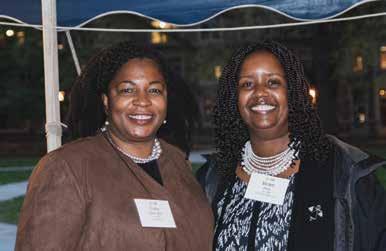
Let the People Livestream
Emmy Parsons, ’13, appeared on CNN to discuss the trial of former Minneapolis police officer Derek Chauvin, who was accused and subsequently convicted in the murder of George Floyd. Parsons, an associate in the Washington, D.C., office of Ballard Sparh, represented a coalition of media organizations who were advocating for the trial to be broadcast live after it became clear that the pandemic would prevent the press and public from attending the trial in person.
WHAT WOULD THE FOUNDERS DO?
From “Delegation at the Founding,” a paper by Professor of Law Nicholas Bagley and Julian Mortenson, the James G. Phillipp Professor of Law, which was published in the Columbia Law Review
“[The public’s right to have access to court proceedings] comes from the First and Sixth Amendments to the Constitution,” she noted on CNN. “Both of those constitutional rights speak to the idea that the press and the public need to be in the courtroom, need to have access, so that they can see that justice is carried out and that defendants are treated fairly…We’re thrilled with how this played out.” At issue were court rules that only allow the use of cameras if both the defense and prosecution agree; in this case, the prosecution declined to assent. The presiding judge ultimately overruled the prosecution and issued an order that allowed for a live broadcast of the trial, citing the extraordinary circumstances of the pandemic and the high-profile nature of the case.
BRIEFS 9 Law Quadrangle • Winter 2022
“Our conclusion is straightforward. The nondelegation doctrine has nothing to do with the Constitution as it was originally understood. You can be an originalist or you can be committed to the nondelegation doctrine. But you can’t be both.”
Back to Normal(ish)
Life and learning at the Law School has returned to something close to normal, and most in-person activities have resumed. Masks and certain other public health measures remain in place, but students, faculty, and staff are able to once again convene in the Law Quad—a welcome change of pace.
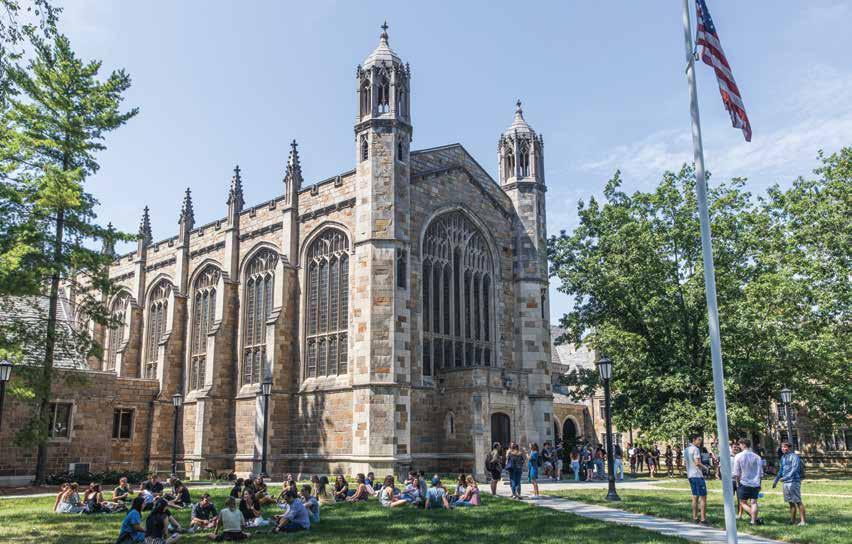
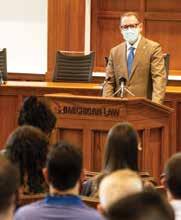
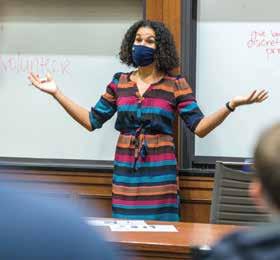
On this page, clockwise from left: David A. Breach Dean of Law Mark West speaks at fall orientation, Professor Sherman Clark lectures 1L students in Torts, and Tiffani Sadek, clincial assistant professor of law, leads a discussion in the Zell Entrepreneurship Clinic.
At right, clockwise from top: Professor Nicholson Price teaches Intellectual Property; Professors Dana Thompson, ‘99, Dan Crane, and Adrian Ohmer, ‘13, speak to 1Ls at fall orientation; students gather in the Upper Commons; and Professor Barbara McQuade, ‘91, teaches Criminal Law. At center, Professor J.J. Prescott holds a conversation in the inner courtyard of Hutchins Hall.
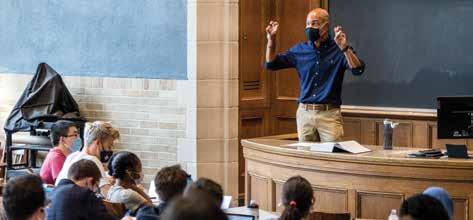
BRIEFS
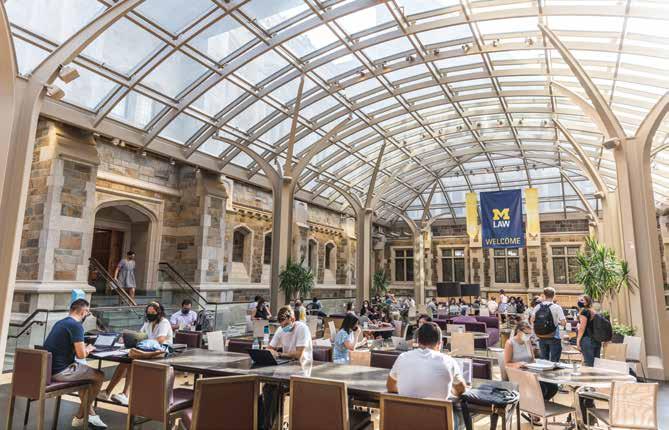
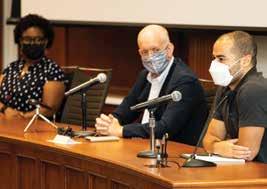

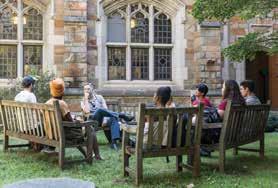
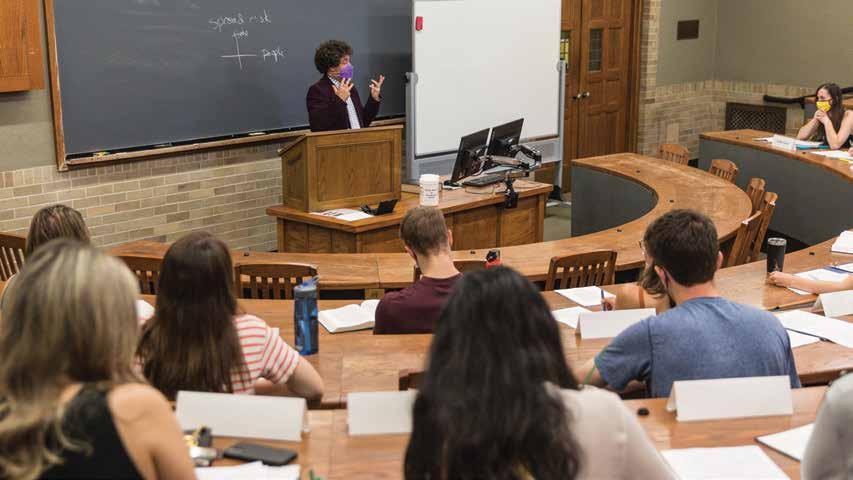
11 Law Quadrangle • Winter 2022
IN PRACTICE


Law at the Bottom of the Earth
 By James Weir
By James Weir
Ted Kill, ’07, covered a lot of ground between Michigan Law and his arrival in Antarctica, when he travelled to the continent as part of an interagency federal government inspection team. The way he tells it, his journey to the bottom of the earth started with a clerkship at the International Court of Justice that he secured through Michigan Law, which served as a bridge to joining the State Department’s Office of the Legal Adviser. In his role at State, Kill has litigated international disputes over everything from aircraft parts to eight-million-year-old bones, worked on the controversial Keystone XL pipeline under two administrations, and much more. His assignments have been so broad that it’s tough to list them on the spot, but Kill also counts representing the United States at the International Whaling Commission and the Arctic Council, as well as helping negotiate instruments for the resettlement of vulnerable Afghan nationals, among the highlights of more than a dozen years of public service.

12 Law Quadrangle • Winter 2022
In February 2020, Kill served as deputy team leader for a U.S. Antarctic inspection team tasked with checking research bases for compliance with the Antarctic Treaty and its Environmental Protocol. The agreement went into force in 1961, setting aside the continent for peaceful scientific research and banning the use of military resources for non-scientific purposes. While claimant states did not renounce their claims, no acts or activities while the treaty is in force can be used to support any territorial claim.

“If you go back to 1959, there were seven claimants, and there was a sense that it would be better if Antarctica were taken off of the geo-political chessboard,” says Kill. “And the idea behind the Antarctic Treaty was to say, ‘Let’s just cool it; nobody can live there, so let’s preserve it for peace and science.’ Not to use a pun— it’s what everybody says—the idea was to freeze the claims.”
Under Article VII of the Antarctic Treaty and Article 14 of the Environmental Protocol, every consultative party has the right to inspect any station on the continent to ensure compliance, and the U.S. has conducted 15 inspections since the treaty went into force. During the 2020 expedition, Kill and the delegation visited bases operated by South Korea, China, and Italy. Though one might assume these inspections are fraught with geopolitical tension, cooperation runs deep amongst Antarctic-based scientists and support staff.
“Of course you are looking for violations, but you are also there to reinforce the spirit of the treaty. The way the inspection reports are written is mainly to help identify steps that could be considered in order to make each station even better.” According to Kill, this is a manifestation of the Antarctic spirit. “To a certain extent, you have to get along in Antarctica because if you don’t, you’ll freeze and die.”
The harshness of life in Antarctica was clear even before Kill arrived, when travel to McMurdo Station—a U.S. base that is also the largest settlement on the continent—was delayed for two days due to weather conditions. But getting to McMurdo was only the beginning. Travel to the South Korean station required hours on a helicopter flight each way, with a stop at a fuel depot so remote that it needed to be dug out of the ice.
To arrive at the Italian and Chinese installations, Kill and his colleagues traversed the southernmost sea on earth, the icepacked Ross Sea. They traveled in the U.S. Coast Guard’s only heavy icebreaker, the Polar Star, which can break through ice up to 21 feet thick. When they arrived at the stations, however, the delegation received warm welcomes. “The Italians are famous in Antarctica for their affogato, the espresso with ice cream in it, and they also have great Italian cheese and pasta. The Koreans had cookies set out for us and seemed to enjoy showing us
around. The Chinese were very nice and receptive, and we gave them an orange, which they hadn’t had in many months, so that was well received.”
Kill first began working on Antarctic issues when he started in the Office of the Legal Adviser’s Office of Oceans and International Environmental Scientific Affairs in 2016. In 2019 he was named chair for legal, policy, and institutional matters of the Antarctic Treaty Consultative Meeting (ATCM), the annual meeting that was established under the treaty as a forum to discuss issues and adopt legally binding measures to govern Antarctica. As chair, he helps manage the paper process in advance of the meeting, works to build consensus during negotiations, and prepares sections of the ATCM’s official report for the annual meeting.
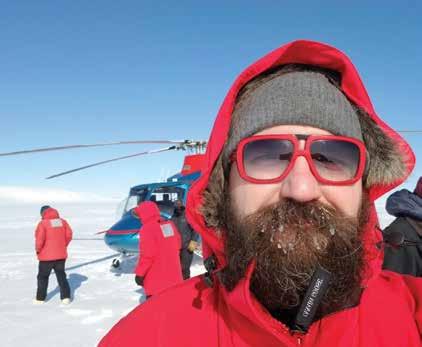
“There’s a flurry of activity leading up to the meeting, and I review all the papers and start to get an idea about where there is consensus because it’s really a consensus-based organization,” he says. “We pride ourselves on how well we’re able to work together.”
Though Kill emphasizes his gratitude for a rewarding career at the State Department, the inspection mission is a standout. “It was a long way from Hutchins Hall, and there’s no question it’s the coolest thing I’ll do in my career. It was the experience of a lifetime.”
PHOTOS COURTESY OF TED KILL
Scoring a Win for Student-Athletes
By James Weir
It was something of a full-circle moment for Linda Coberly, ’95, when she set out to coordinate amici filings in the landmark NCAA v. Alston case, in which student-athletes successfully sued the NCAA by arguing that the organization’s compensation practices violated antitrust laws. Not only did her first call go out to a friend and former classmate she had known since Michigan Law orientation—Michael Carrier, ’95, who quickly enlisted the support of Christopher Sagers, ’97—she was once again preparing materials for Supreme Court argument, a process she’s been familiar with since she clerked for Associate Justice Stephen Breyer after law school.
NCAA v. Alston concerned NCAA rules that prevented schools from offering enhanced packages of education-related benefits to attract students. Winston & Strawn, where Coberly chairs the appellate and critical motions practice, has one of the top sports practices in the nation and represented the student-athletes from an early stage. As counsel of record on the case, Coberly was involved in briefing the Ninth Circuit, opposing certiorari at the Supreme Court, and then in preparing the case and briefing the case for arguments.
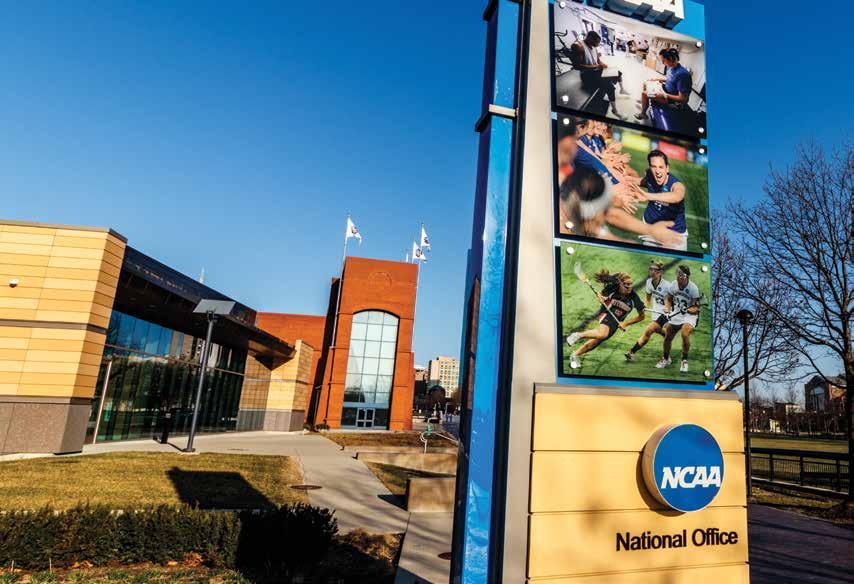
When it came time to coordinate amici filings, Coberly turned to her classmate Carrier, a professor at Rutgers Law School and a prominent antitrust scholar, to provide a brief on behalf of academics who specialize in antitrust issues. Carrier reached out to Sagers, another leading antitrust scholar and professor at Cleveland-Marshall College of Law, and they spearheaded an amici filing on behalf of 65 professors of law, business, economics, and sports management.
Coberly, Carrier, and Sagers weren’t the only Wolverines involved in the case. Coberly’s colleagues at Winston & Strawn included graduates of the Law School and U-M undergraduate programs, including partners Derek Sarafa, ’97, who participated at the trial court level before his death in 2015, and Jeanifer Parsigian, AB ’06. Coberly also coordinated the case with lawyers from Hagens Berman, including Steve Berman, BS ’76.
The brief that Carrier and Sagers spearheaded ultimately was cited in the opinion written by Associate Justice Neil Gorsuch, when all nine justices ruled in favor of the student-athletes. After argument, Coberly felt good about receiving a favorable ruling, but it was particularly gratifying to receive a unanimous decision.
“The ruling is really important for the many athletes who sacrificed so much for their teams, including their health and their bodies,” Coberly says. “The majority of those students never go pro, and they are people for whom some additional internships, tutoring, and other benefits related to education will make a real difference—in their lives and in their ability to support themselves when they leave school.”
Coberly has been with Winston & Strawn since 2004, when she joined the firm as a lateral partner from the trial and appellate practice at Mayer Brown. Her intention at Winston & Strawn was to build an appellate practice that broadened the firm’s understanding of what the practice could be. The first step was persuading colleagues that it could be a growth opportunity for the firm, and that there was value in building a team of appellate specialists that would work more closely with partners in trial litigation. “I have found that the same clients who are sophisticated about wanting a trial lawyer at the top of their cases are also sophisticated about wanting appellate lawyers involved,” she says. “It’s been a really great fit for me.”
IN PRACTICE
At Winston & Strawn, she wanted to establish herself as someone who was not just a brief writer but a first-chair appellate advocate. “There were a few of us creating this practice group, and I wanted a model that was not just appellate lawyers as brief writers but instead appellate lawyers as lead counsel for their clients on appeals and otherwise,” she says. “Appellate lawyers are very well suited to be trusted advisors because we have an opportunity to talk with our clients about their most important strategic legal issues, and we can help them coordinate their positions across a large body of individual litigation matters. You don’t get to do that if you’re only writing briefs in your office.”
Coberly leads teams at the trial court level in motions-intensive litigation, particularly for securities cases—which are often litigated by motions—because of her familiarity with the legal issues that will drive the outcome. This is a somewhat unusual role, but for Coberly, it’s a symbiotic intersection of her appellate experience and her expertise in securities-related law. She also frequently collaborates with trial lawyers on class actions, which are also motions intensive. And for cases that go to trial, she serves as appellate lawyer on the trial team, working with the trial lawyers to prepare the case for success on appeal. To Coberly, this varied approach helps keep the job interesting.
Until September 2021, Coberly served as managing partner of Winston & Strawn’s Chicago office, a position she held for six years. She remained chair of the firm’s appellate and critical motions practice throughout that time and led the firm’s largest office through the first 18 months of the pandemic. Among other
priorities, Coberly sought to further integrate the different functions of the firm during her tenure as managing partner, particularly as it relates to the lawyers and the non-legal staff.
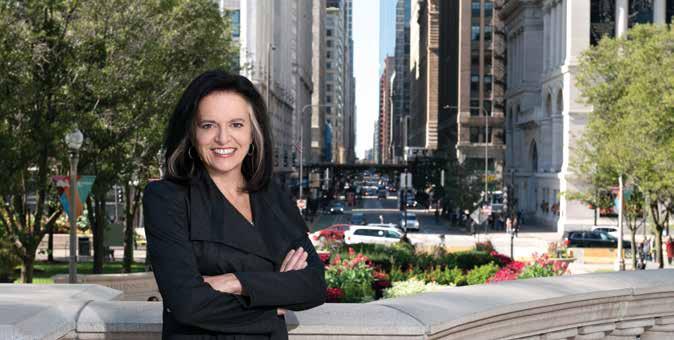
“We couldn’t do what we do for our clients without our nonlawyer staff, and I wanted to make sure everyone felt like they were playing a role in the work,” she says. “I found that our staff loved hearing about the work during our team meetings, including pro bono work we’re doing in the community. It’s important to pull our people together across their functions and help everyone feel part of a single team.”
In some ways, the pandemic helped to encourage this kind of community building. “The pandemic blasted through the separation between the personal and professional in a way that I don’t think any of us had experienced before,” she says. “This has been a very taxing period, and it’s really important to talk about that and acknowledge the impact, and for each of us to be kind to one another and respectful to one another as we work through this difficult time. I think having that level of connection and authenticity with one another has helped us to build culture across distance during the pandemic in a pretty effective way.”
Coberly says that one advantage of being at a large firm is the opportunity to work on a wide variety of projects, from securities litigation to Supreme Court cases to a breadth of pro bono projects, including work on immigration cases and advocacy in support of the Equal Rights Amendment, a particular passion of hers. “It’s a diverse and interesting practice. Every day there’s something different, and that’s one of the reasons I love it,” she says. “It’s an endlessly fascinating job to have.”
Law Quadrangle • Winter 2022 15
IN PRACTICE
On The Move



MobilIty at Michigan l aw

IN JUNE 2018, a boxy vehicle rolled onto the University of Michigan’s North Campus Research Complex. Although it could have been mistaken for a run-ofthe-mill shuttle running a mundane route around the complex, one detail set it apart from the average bus: the lack of a driver. The autonomous vehicle (AV) was part of a pilot program operated by Mcity, U-M’s center for research related to the future of transportation and mobility. The pilot was the first of its kind in the country because rather than technical research, the study was focused on how humans would react to interacting with and riding in an automated vehicle, including passengers, drivers in other vehicles, pedestrians, and other road users. By moving beyond technical questions to broader social issues—exploring what it means to share the world with machines that can act independently from humans—the pilot program represented an important shift in AV testing.

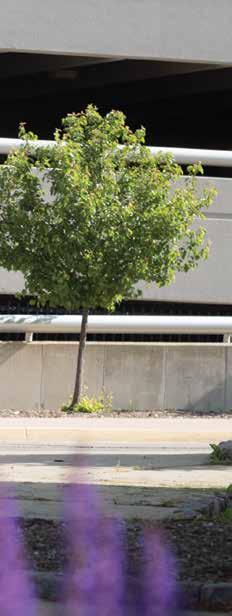
AVs like the Mcity shuttle are just one of the many emerging transportation technologies that promise to change more than just who, or what, is driving your car. From the proliferation of electric scooters in many cities, including Ann Arbor, to automated delivery robots rolling down sidewalks and delivery drones zipping overhead, the new mobility revolution is generating novel ways to move people and goods. Emerging mobility technologies promise to reduce traffic deaths, increase access to transportation for the elderly and people with disabilities, and revolutionize how we move through the world.
Integrating new mobility technologies into our transportation system isn’t just a technical challenge. It also presents new legal and regulatory questions, none of which have simple solutions. And just as Mcity has put the University at the fore front of the technological side of this revolution, faculty, staff, students, and alumni of Michigan Law are working on the cutting edge of this exciting new area of law.
Ian Will I ams, ’18
By
Issues of First Impression

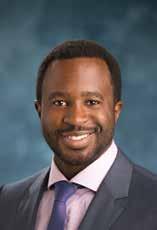


Before the Mcity shuttle could make its debut, the University had to know if it was legal to operate an AV in public. With a potentially historic project on the line, the University called on a diverse team of experts to ensure the program could move forward, including C. Ndu Ozor, ’09, associate general counsel at U-M. “The process for approval was completely novel because the University had not previously launched a project of this kind,” he recalls. “Risk Management was in the room; the University’s vice president of research, a number of attorneys, various faculty with expertise in the AV, robotics, or engineering space were present.”
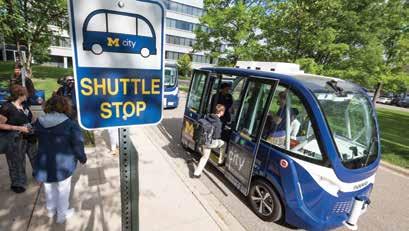
While the pilot program was in its planning stages, Michigan state legislators were in the process of writing updated AV laws. The University’s Office of Government Relations successfully collaborated with lawmakers to clarify language governing research centers, paving the way for the project to move forward. “We thought the language provided the University enough protection for the purposes of having a shuttle launch on roads open to the public,” he says. “There were a few nuances that had to be addressed to make it work, but we got a number of stakeholders involved, including the National Highway Traffic Safety Administration (NHTSA).”

The team conducted internal research and hired outside counsel. Moreover, they brought the NHTSA to Ann Arbor to simulate the process and protocols in the event of an accident. The pilot program ultimately cleared the technical and regulatory hurdles and went ahead, providing researchers with actionable data related to how people respond to driverless vehicles—one of the many examples of U-M leading the charge in mobility.
 C. Ndu Ozor, ’09
C. Ndu Ozor, ’09
The sTate o F T he Law


After more than a century of automobiles, two centuries of railroads, and centuries more of maritime traditions, there are well-established laws and customs governing how we move about the world. Federal regulations dictate the safety of our cars and their emissions, and federal money helps fund our highways and mass transit systems. States regulate who can drive and require things like license plates to dictate what vehicles can be on the road, while also setting most traffic laws. Local governments also have a hand in traffic and parking rules and often operate local public transit networks. The system is fragmented and complex and was not set up to accommodate new technology like driverless vehicles.
One issue is that AVs and other new mobility technologies often exist outside of established legal categories and definitions. For example, the federal government’s main tool for regulating the design of motor vehicles, the Federal Motor Vehicle Safety Standards (FMVSS), requires vehicles to have human-centered controls like steering wheels and brake paddles, which may not be required on certain AVs. Likewise, many state laws reference “drivers” throughout their traffic laws, codifying a required human element.
Some of these issues have been solved at the state level; more than 30 states, including Michigan, have passed laws that allow for AV testing and deployment in some capacity. A common solution is to add “automated driving system” (ADS) or a similar term into the relevant laws, enabling legal alternatives to human drivers under certain conditions. In Michigan, for example, a 2016 law

defined ADS as “hardware and software that are collectively capable of performing all aspects of the dynamic driving task for a vehicle on a part-time or full-time basis without any supervision by a human operator.”

Whether the next phase of AV regulation comes at the state or federal level is among the most consequential questions facing the industry. Within the United States, the car, as a technology, has been primarily regulated at the federal level. But the driver, as a person, has been primarily regulated by the states. “For now, there’s still a big question that I don’t see being answered anytime soon, which is ultimately who is going to decide these big policy and legal questions, and whether it will be the states or the federal government,“ says Dan Crane, Michigan Law’s Frederick Paul Furth Sr. Professor of Law. “And that’s one of the things that the Law School and U-M can bring to the table in this area, is to convene stakeholders through conferences and our journals and to make these important conversations happen in ways that might not happen organically.”
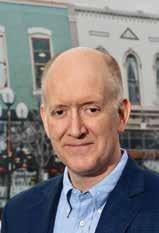
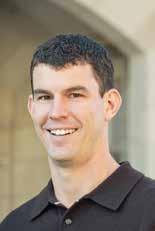
Legislation to modify existing motor vehicle regulations at the federal level has been proposed almost yearly, but efforts have been unsuccessful to date. Initiatives at the state level have helped with testing and development, but in
terms of wide-scale adoption of AVs, remain a stopgap measure without federal guidance. “Unsurprisingly, the gridlock in Congress stalled the push for federal legislation. Part of this delay is because the technology itself has not been ready for full deployment,“ says Ozor. “I think of it as a sort of tipping bucket and that once the technology advances materially, there’s going to be renewed emphasis on making sure we have appropriate legislation. There’s a significant amount of work yet to be done because if you look at the current legislation in place across differing states, the variability is extremely problematic.”
Without congressional direction, agencies like the NHTSA are left to regulate the industry with limited tools. One tool is the ability to grant exemptions to the FMVSS; however, this process is not a silver bullet. “There is an exemption that’s pretty small, currently around 2,500 vehicles, that allows vehicles to be deployed that don’t meet safety standards,” explains Bryce Pilz, ’00, executive director of licensing and strategic alliances for U-M Innovation Partnerships, which helps commercialize ideas that emerge from University research. “But it’s not enough for a company to commercially deploy in a profitable way,” Pilz adds, illustrating one of the barriers to the AV industry’s future growth.
Law Quadrangle • Winter 2022
Bryce Pilz, ’00
Dan Crane, Michigan Law’s Frederick Paul Furth Sr. Professor of Law
other Legal Issues




The early days of the AV industry were filled with bold proclamations of the imminent automation of our roadways. But expectations have been tempered in recent years, and the introduction of autonomous driving technology has proven to be more complex and drawn out than many expected.
“Part of my understanding earlier on had been that the AV was a binary concept in which you went from having a human driving a car to a car that just drove itself,” says Crane. “As more technology has come toward the market, with different degrees of automation, it’s clear we’re not going whole hog right away. And what that means is that the challenge for law and regulation is even greater than we started with.”
Some legal issues, like liability—once seen as a major obstacle for AVs, and one of the issues commonly cited as a barrier to federal legislation—no longer seem as intractable. “I think we have largely moved on from the early assumption that liability would be a significant impediment to the deployment of AVs and are focused on more pressing issues, such as creating a regulatory framework that will allow deployment of AVs at significant volumes,” says Emily Frascaroli, who teaches a class on AVs and the law at Michigan Law and is managing counsel of the product litigation group for Ford Motor Company (she also holds a U-M master of engineering degree).


Pilz, intimately familiar with the novel challenges that arise when advising technology startups, notes that the mobility space regularly raises new issues and that it’s up to companies and regulators to address them as they arise. “There’s some open-ended questions, there’s going to be some very novel questions out there. But they’ll be sorted out; people will be able to price that into their business models and find some way to insure against it.”
While progress is being made on some issues, the maturing of the AV industry, combined with the deployment of other new mobility technologies, implicates several other legal areas. Even land use will be affected by evolving mobility options. The widespread adoption of AVs could lead to additional urban and suburban sprawl, as longer commutes transform from time wasted behind the wheel to potentially productive time working. Likewise, if large fleets of shared AVs are deployed to replace (or, more likely, augment) privately owned cars, the demands for parking could change drastically as vehicles move on to the next passenger rather than sit idly at home or in office parking lots.
Privacy is another key consideration. AVs and other new mobility technologies generate a lot of data, much of it potentially sensitive, and patterns can be drawn from seemingly innocuous data; consider, for example, records of traveling to the doctor for a private medical issue. How that data is stored and used, and when third parties like advertisers or even law enforcement are able to access it, are all issues that need to be addressed. Unlike the European Union’s General Data Protection Regulation, which is a comprehensive set of rules that govern how data can be collected and used across a broad spectrum of sectors, the United States regulates data at the industry level. Laws govern how health and educational data can be used, for example, but industry-agnostic data privacy regulations are lacking at the federal level. As with laws related to getting AVs on the road, individual states have begun taking matters into their own hands while federal initiatives are deliberated but not, as yet, put into place.
Another area of major interest is equity and civil rights, a current focus of the U.S. Department of Transportation under President Biden. Much of that discussion is around how to eliminate or correct the inequalities within our transportation system, such as unequal access to transit or trying to remove or alter urban highways that split up neighborhoods. “One of the big things I’ve learned is that you can’t focus on the question of the technology and the law independently from the wider cultural, economic, and political ecosystem in which those questions arise—and around the world that looks very different from place to place,” says Crane. Ensuring the promise of new mobility technology while not exacerbating the mistakes of the past is key. “There are all kinds of good reasons to think that this mobility revolution is something that we should be encouraging, but who’s asking the questions about the distributed effects in the world and how we make sure that this is a rising tide that really lifts all boats?”
Emily Frascaroli
Mobi LI ty in T he Law Quad



Michigan Law launched its Law and Mobility Program in 2018. The program is a partnership with Mcity and the State of Michigan and is a unique effort to build discussion around the legal aspects of emerging transportation technologies. Based in Ann Arbor, the program is co-directed by Crane and Professor Bryant Walker Smith of the University of South Carolina School of Law, who has been one of the leading experts on the AV industry since its infancy. The program is run as a partnership between the schools and is overseen by an Ann Arbor-based fellow who runs its day-to-day affairs and works with students from both schools. The program publishes the Journal of Law and Mobility, the only legal journal in the nation that is dedicated to emerging transportation technology. For Crane, the journal’s success comes from attracting authors from different fields who can create “cutting-edge analysis and reflection on the set of legal and regulatory questions around this mobility revolution itself.”

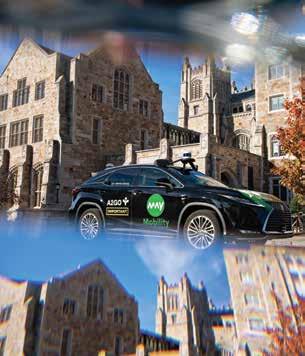
For the last five years, Michigan Law students have been able to take a class on AVs and the law, taught by Frascaroli, who in addition to her position with Ford sits on the Michigan Council on Future Mobility and Electrification and is a member of the Journal of Law and Mobility’s editorial board. During that time, Frascaroli has noticed a change in what topics most interest students. “My
students have always been interested in the technology,” she says. “In the early years, there was a focus on safety, regulation, and privacy. Over time, I have seen a shift to more interest in current social topics, such as accessibility, racial equity, and the environment.”
The class not only discusses the legal and regulatory structures around AVs but also requires students to take on roles within an AV crash scenario.
While the class has to keep up with an ever-changing AV landscape, Frascaroli notes that “one thing hasn’t changed at all—people are fascinated by and excited about the technology and the freedom of movement that it promises.”
The Law and Mobility Program hosts an annual gathering to discuss the developments in the industry, and its 2021 online conference, “Brave New Road: The Role of Technology in Achieving Safe and Just Transport Systems,” brought together experts from academia, industry, government, and advocacy to discuss equity and civil rights issues related to emerging transportation technologies. It was the third annual event, following “(Re)Writing the Rules of the Road” in 2019, which dealt with more basic questions of AV regulation, and the 2020 conference, “Global Perspectives on Law, Policy, and Mobility Innovation,” which brought guests in from around the world to learn more about the transportation needs of middle-income and developing nations.

The Fu T ure I s Now
AsMichigan Law’s mobility-focused work continues, Ann Arbor’s streets are fast becoming a hub for a number of new mobility technologies, including bike-sized delivery robots from Ann Arbor-based Refraction AI, seen around town delivering Zingerman’s sandwiches. In October 2021, Mcity partnered with May Mobility to launch A2Go, a fleet of autonomous on-demand taxis that serve a portion of Ann Arbor that includes Kerrytown, Central and North Campus, and the State Street corridor. If Michigan Law students want a free-of-charge ride to and from class in an autonomous vehicle, all they need to do is download an app on their smartphone and request a ride, à la Lyft or Uber. At Michigan Law and in Ann Arbor—not to mention the rest of the country and the world—it’s an exciting time to shape the future of mobility.
Ian Williams, ’18, was the inaugural Law and Mobility Fellow at Michigan Law from 2018 to 2021 and is now an associate with Venable LLP in its Washington, D.C. office, where he works in the autonomous and connected mobility group. In the interest of full disclosure, the University of Michigan, Ford Motor Company, and Lyft are all clients of Venable.
Monica Hakimi, the James V. Campbell Professor of Law, has been named one of two editors-in-chief of the American Journal of International Law. Hakimi teaches and writes on public international law and U.S. foreign relations law. The appointment is effective in April 2022.




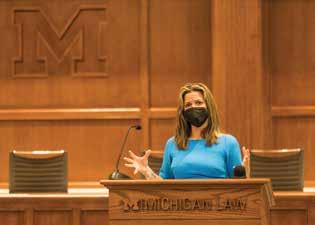
Professor from Practice Barbara McQuade, ’91, a former federal prosecutor, and Professor of Law Alicia Davis, who teaches and writes in the fields of corporate governance, capital markets, and mergers and acquisitions, were named to Crain’s Detroit Business’s 100 Most Influential Women, a list that is compiled every five years.

Catherine A. MacKinnon, the Elizabeth A. Long Professor of Law, was one of only two women included on a recent list of the most cited legal scholars of all time, according to new research published in The University of Chicago Law Review. MacKinnon is number 40 on the list, which was compiled by a librarian from Yale Law School.

Margo Schlanger, the Wade H. and Dores M. McCree Collegiate Professor of Law, has been nominated to serve as Assistant Secretary for Civil Rights at the U.S. Department of Agriculture. If confirmed, she will take a leave of absence from Michigan Law to lead the USDA’s anti-discrimination efforts in program delivery and the treatment of employees. Schlanger founded Michigan Law’s Civil Rights Litigation Clearinghouse, a national repository of information about largescale civil rights cases.
David M. Uhlmann, the Jeffrey F. Liss Professor from Practice and the director of the Environmental Law and Policy Program, has been nominated by President Biden to serve as assistant administrator for enforcement and compliance assurance at the U.S. Environmental Protection Agency. If confirmed, he will lead federal criminal, civil, and administrative enforcement of environmental laws, including the Clean Air Act, the Clean Water Act, hazardous waste laws, the Safe Drinking Water Act, and the Toxic Substances Control Act.
Constitution Day in the Quad
The Law School welcomed Michigan Secretary of State Jocelyn Benson to Hutchins Hall to speak about her experience in state government and the importance of election security and voting rights, among other topics. The Constitution Day event was moderated by Richard Friedman, the Alene and Allan F. Smith Professor of Law, and is held at Michigan Law every September to commemorate the signing of the Constitution on September 17, 1787.
22 @ UMICHLAW
FACULTY NEWS
Law Quadrangle • Winter 2022
Luis C.deBaca, ‘93, Joins Michigan Law Faculty
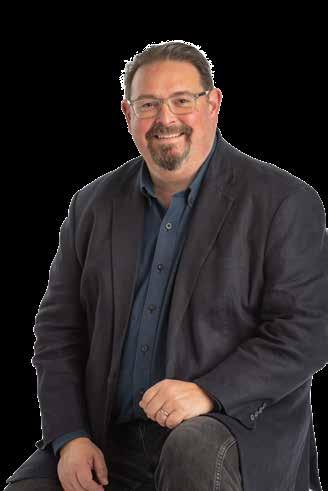
Luis C.deBaca, ’93, a diplomat who served in the Obama administration as ambassador-at-large to monitor and combat trafficking in persons and as director of the U.S. Department of Justice’s Office of Sex Offender Sentencing, Monitoring, Apprehending, Registering, and Tracking, has returned to Ann Arbor to join the Law School’s faculty. For the past two years, C.deBaca has been a lecturer at Yale Law School and the Yale School of Architecture, and Senior Fellow in Modern Slavery at Yale University’s Gilder Lehrman Center for the Study of Slavery, Resistance, and Abolition.
Following his graduation from the Law School, C.deBaca joined the Criminal Section of the Civil Rights Division through the Attorney General’s Honors Program, where he investigated and prosecuted cases of police misconduct, hate crimes, and involuntary servitude/slavery. He later served as counsel to the U.S. House Committee on the Judiciary. From 2009 to 2014, C.deBaca served as ambassador-at-large to monitor and combat trafficking in persons. In 2017, he retired from the Department of Justice as one of the country’s most decorated federal prosecutors.
C.deBaca has been active in the Hispanic National Bar Association, on police reform initiatives, and as a member of the Council on Foreign Relations. A graduate of Iowa State University with an emphasis on rural communities, C.deBaca was an editor of the Michigan Law Review and chair of the Latino Law Students Association during his studies at Michigan.
REMEMBERING 9/11
To commemorate the 20th anniversary of 9/11, the Law School hosted a panel organized by the U-M Donia Human Rights Center that examined the attack’s lasting impact on victims and for individuals caught up in the counter-terrorism initiatives that followed the event. The panel was moderated by Steven Ratner—the Bruno Simma Collegiate Professor of Law and the director of the Donia Center—and included commentary from Visiting Professor of Law Karima Bennoune, who is the special rapporteur on cultural rights at the United Nations and the Martin Luther King Jr. Professor of Law at the University of California, Davis.
23 @ UMICHLAW
By Chelsea Liddy Pivtorak
Dialogue, debate, and deliberation are words that are synonymous with the law school experience—but what about design? One of Michigan Law’s newest course offerings challenges students to apply design thinking and problem-solving skills to their own lives and careers in the law.
Open to second- and third-year students and taught by Professors Bridgette Carr and Vivek Sankaran, Designing a Fulfilling Life in the Law uses a non-traditional approach to prepare students for a career in the legal profession. “Law school is three years of not just learning the skills you need but figuring out the type of lawyer and person you want to be. I think we do a great job on the skill component, but this is also a transition time for so many of our students, and they have so many questions, thoughts, and doubts about the type of lawyer they want to be. This is the space for them to explore it,” says Sankaran, whose teaching focuses on children’s rights and public interest law, and who also directs the Child Advocacy Law Clinic and the Child Welfare Appellate Clinic. “Our goal is to present strategies on how we can reshape and reframe how students approach this experience and beyond, and give them tools to thrive.” The course grew out of other experiential learning opportunities offered by the Law School, including the interdisciplinary Problem Solving Initiative (PSI), which has broadened the scope of a legal education into a more well-rounded and holistic curriculum. “For me, it was an obvious extension of the PSI program to say, ‘We don’t always have to look to external problems to tackle. We can use these skills on internal questions that we have as well,’” says Carr, the director of the Human Trafficking Clinic who also served as associate dean for strategic initiatives and led the PSI from 2018 to 2021. “We bring together students to teach them problem-solving skills, but the problem they’re tackling is how to know themselves well enough to have a life where they flourish. The ‘design your life’ concept started at Stanford University, but I’m not aware of any other law school that has decided to incorporate it.”

24 @ UMICHLAW
New Design Thinking Class Teaches Students to Advocate for Themselves B E CURIOUS.TRY STUFF. STAYCONNECTE D . BE CURIOUS . TRY STUFF. STAYCONNECTED. DESIGN YOUR LIFE
“So much of what we do here is teaching students to apply the same skillset to themselves that lawyers often call upon to solve other people’s challenges,” adds Sankaran.
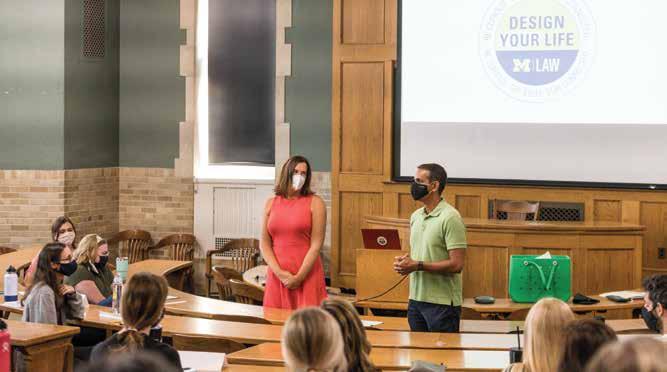
Launched in Fall 2020, students utilize the iterative stages of design thinking, including exploration, ideation, prototyping, and realization to consider how they might maximize their own individual success and happiness in life. A typical class session might see students identifying their own core values, conceiving alternate career paths for themselves, and interviewing guest speakers about their own career trajectories. The class is structured around small group discussion, and students who have already taken the class act as peer mentors to help guide conversations. Current 3L Nicole McFarland says, “Professor Carr always tells us that there are so many unique opportunities out there, and if all goes well, our legal careers will be long and dynamic. This class has taught me how to think big but prototype small so that I am fully informed on what I want out of my career and know how to make it happen. I feel more confident and excited for my future now that I have the tools to craft it intentionally.”
Tamar Alexanian, ’21, now a Skadden Fellow at the Children’s Law Center of California, took the class in her final year of law school and also served as a peer mentor. She calls the class a “breath of fresh air” that strongly influenced her decision making. “This class taught me to think creatively and differently in a profession that is notoriously prescribed. It was so useful in my 3L year, especially during a pandemic when I was questioning a lot about my future. All of us were helping each other reimagine what options are out there and think about ways we can bring our whole selves to our profession. As lawyers and at law school we need to train each other to be creative and find ways to be happy in our legal careers, which is not something that is often discussed,” she says.
Mental wellness is an ongoing topic of conversation within the legal field, and many organizations have begun to be more vocal about the mental health challenges faced by lawyers and law students. “The ABA is now calling for law schools to offer classes on value development and professional identity. If teaching, research, and service are the trinity of the University of Michigan, I think part of our service to the profession is to start getting our law students to think about some of these issues so they don’t become lawyers who struggle with mental health challenges once they leave us,” says Sankaran. “One of the things that sets Michigan Law apart from other places is that we have a deeper connection and investment in students: who they are and who they’re becoming. And if that’s true, we have to create spaces for students to not only learn skills but also think about who they want to become.”
25 Law Quadrangle • Winter 2022
Pro Bono Program Builds on Best-Ever Year
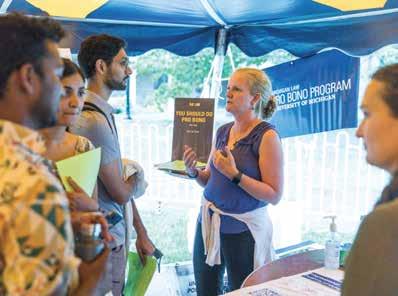 By Peg Schreiner, 2L
By Peg Schreiner, 2L
In a year where virtually everyone needed extra help to get by, Michigan Law students went above and beyond to offer their assistance through the Law School’s Pro Bono Program, which asks students to voluntarily commit to pro bono service outside of the classroom. Despite the constraints of the pandemic, a record-breaking 252 students participated in the program during the 2020–2021 academic year.
Hill notes that the experience has been a useful supplement to his classes. “We get to read actual motions and see how the law works when it’s not resulting in [opinions published in casebooks] or when issues are resolved out of court,” he says. Hill, who has been involved with the project since his 1L year, describes the work as the “single most defining feature of [his] law school experience.”
Some projects faced initial obstacles but ultimately adapted to a remote setting. Erik Lessler, a 2L student leader involved with Street Law, a national legal and civics education program for secondary school youth, says that online programming made it more difficult to “spur the connection” with students at the Juvenile Detention Center (JDC). But he notes that “the law students were eager and willing to adjust their teaching styles to ensure the students stayed engaged.” Looking ahead, Lessler plans to teach in person at the JDC two hours a week.
Similarly, the Michigan chapter of the International Refugee Assistance Project shifted some of its focus to accomodate more remote work. Vishal Sharoff, a 3L, worked on a court monitoring project that dealt with COVID-related procedures in immigration courts and ultimately drafted a research brief on the issues. Sharoff credits the “increase in law students wanting to join our chapter” with the organization’s ability to carry out plans to launch a new resettlement project in the area in cooperation with local immigrant rights groups and nonprofits.
“Students did a great job getting the word out via student listservs and making a strong effort to pivot to online work,” says Amy Sankaran, ’01, director of externships and the Pro Bono Program. “Most people come to law school because they are excited about the idea of using law to do something practical, and pro bono is a chance to do that before even joining a clinic or having a summer job.”
Sankaran notes that while some projects faced challenges, others seemed serendipitously structured for the online year. One well-prepared project was the Civil Rights Litigation Clearinghouse, an online repository of documents and analysis about important civil rights cases that was founded in 2006 by Margo Schlanger, the Wade H. and Dores M. McCRee Collegiate Professor of Law. Justin Hill, a 3L, says there was a flood of new work into the program during COVID, in particular voting rights cases and conditions of confinement cases in the nation’s prisons, as plaintiffs around the country utilized Clearinghouse resources to bolster their own complaints.
This year, with most classes back in person and the ability to connect with clients and cases mostly restored, the Pro Bono Program’s future looks bright. Michael Allen, a 1L, participated in an expungement fair during orientation to help Michiganders take advantage of the state’s new expungement law. The law expands eligibility to petition for an expungement in several ways and creates a new process that will automatically seal certain nonviolent conviction records if a person has remained conviction-free for a period of time.
Allen said that the expungement fair was an eye-opening experience to kick off his law school career. “Whether it’s someone looking for a new home or employment, or just looking to move on from a decade-old conviction, it’s been fulfilling to take part and help them start the process. This project has given me a sense of duty to do more, and I plan to continue to take action.”
26 Law Quadrangle • Winter 2022 @ UMICHLAW
Prof. Sankaran speaks with students about joining the Pro Bono Program
Environmental Law and Policy Program Hosts National Climate Advisor
 By Kate Meulemans, 2L
By Kate Meulemans, 2L
As part of the ongoing Environmental Law and Policy Program Lecture Series, Michigan Law welcomed the first ever White House national climate advisor, Gina McCarthy, to speak about current federal efforts to address climate change. McCarthy joined the event virtually from her office at the White House, while David Uhlmann, the Jeffrey F. Liss Professor from Practice and the director of the Environmental Law and Policy Program, moderated and fielded questions from students who attended the event remotely as well as in person.
“Between climate, which we’re going to talk about today, and environmental justice, which we’re going to talk about in [the next ELPP event], there aren’t any bigger issues facing our nation and the world from an environmental standpoint,” Uhlmann said in his opening remarks. “Both are significant priorities for President Biden, both are getting lots of attention in Washington, and both seem quite worthy of our attention in the Environmental Law and Policy Program.”
McCarthy has extensive leadership experience working on environmental initiatives. She served as administrator of the Environmental Protection Agency under President Obama and as the CEO of the National Resources Defense Council before assuming her current role. As the inaugural national climate advisor, McCarthy oversees the federal government’s climate agenda and helps steer what she describes as a “whole of government” approach to addressing climate change.
“When we talk about whole of government, it means we have a task force that has every cabinet member on it. We meet all the time. Climate is not a secondary consideration…Every one of the agencies is actively involved in looking at the challenge
of climate change,” she said. “One out of three Americans [have felt the effects of climate change] in the last couple of months, between the wildfires and hurricanes and flooding, and the storms and droughts and heatwaves. We’re in a new era when we can see it and taste it and feel it for ourselves.”
In all her roles, McCarthy has worked to frame climate change as something that is inextricably linked to the economy and the people who make up the workforce, noting that investments in climate change mitigation are an opportunity to create well-paying jobs that can help reduce poverty and boost the economy, particularly as it rebounds from the effects of the pandemic. McCarthy also stressed that “we have to move now” in order to achieve the U.S. goal to create a carbon-free power sector by 2035 and a net zero emissions economy by 2050. Despite the challenges posed by climate change, she expressed her excitement and optimism about the road ahead.
“We have to look at this as rebuilding our economy, as moving forward to capture the 21st century and to grow jobs that people need. We must people understand that this is about their lives and their families, and there are steps that they can take that are going to be beneficial not just for climate but for people,” she said. “We cannot accept, or expect people to accept, answers to this question of climate change that are about disinvesting or about sacrifice. This is a time to make people feel positive about momentum and how we build on it. Because frankly, I feel pretty positive about it.”
27 Law Quadrangle • Winter 2022
Sam Zell, ’66, Builds on Commitment to Entrepreneurship at Michigan Law with $2M Gift
In recognition of a transformational $2 million dollar gift from Sam Zell, ’66, and the Zell Family Foundation, the Law School’s clinical program that represents and advises entrepreneurial ventures has been renamed the Zell Entrepreneurship Clinic. This extraordinary show of support for the Law School and its mission builds on a previous $5 million dollar gift from Zell and his foundation.
“The Zell Entrepreneurship Clinic is a tremendous example of what we at Michigan Law and the University of Michigan do so well, which is to harness the excellence of diverse academic programs to provide students with multiple opportunities for success,” says David A. Breach Dean of Law Mark West, who also is the Nippon Life Professor of Law. “The clinic was born of the idea that there had to be a way to partner our student-attorneys with some of the amazing innovations taking place on campus. These partnerships have enabled us to transform promising ideas into real-life solutions, products, and services, and thanks to this gift, the clinic will continue to play a critical role in the U-M entrepreneurial ecosystem.”
The Zell Entrepreneurship Clinic, which was the first of its kind in the United States when it was founded in 2012, is a unique offering that provides training for students interested in working with entrepreneurial businesses. It was seeded by an earlier gift from Zell.
“As founding director of the clinic, I have witnessed the significant impact the clinic’s work has had on U-M’s entrepreneurial ecosystem,” says Dana Thompson, ’99. “I am inspired by what our students accomplish on a daily basis, and none of this would be possible without the generosity of Sam Zell.”
Since its inception, the clinic has advised nearly 300 clients on more than 1,000 distinct matters, including entity formation, conversation, and dissolution; corporate governance; intellectual property protection; employment

law; financing; equity distribution and incentives; technology law, including privacy and data protection; and contract drafting and negotiation. In the 2020–2021 academic year alone, the clinic supported 53 entrepreneurs. More than 350 law students have served in the clinic as studentattorneys since its founding.
“The clinic helps our students clarify their career goals and prepares them for whatever path they choose after Michigan Law,” says Tifani Sadek, co-director of the clinic. “It’s exciting to see our clients grow into thriving, mature businesses that help establish the University of Michigan and Ann Arbor as an entrepreneurial hub of the Midwest.”
SkySpecs, a technology provider in the renewable energy asset management space, approached the clinic when it needed help structuring an angel investment as a convertible note. “We needed legal expertise with this transaction, but we couldn’t afford an attorney at the time,” says Tom Brady, co-founder and chief technology officer of SkySpecs. Student-attorneys in the clinic handled the convertible loan agreement, which went through several iterations to finetune details like payment schedules, interest, and other mechanics. “The clinic made sure our paperwork was completed correctly and submitted on time, allowing the team to focus on the things we do best.”
The Zell Entrepreneurship Clinic is part of a wider network of U-M initiatives that are integrated with the entrepreneurship community at the University and in Southeast Michigan more broadly. Students and faculty at the Law School work closely with the Samuel Zell and Robert H. Lurie Institute for Entrepreneurial Studies at the Ross School of Business, the Center for Entrepreneurship within the College of Engineering, and the Michigan Venture Center, as well as student-run organizations and competitions and grant programs that encourage entrepreneurship among the U-M student body. —JW
28 Law Quadrangle • Winter 2022
IMPACT
Hands-on Experience
Eric A. Cox II, ’17, Head of Growth at Netcapital, Los Angeles Area
For Eric Cox, ’17, the Zell Entrepreneurship Clinic prepared him for life as a lawyer, investor, and entrepreneur—and not just from a transactional standpoint. “Working as a student-attorney in the clinic gave me real-world experience in crisis management and effective communication with stressed entrepreneurs. A client’s fledgling startup might have been a part-time project at the time, but many dreamed of it becoming an essential part of their future careers, and for some it was already their livelihood.”
The clinic imparted the importance of good customer service to Cox, who served as a student-attorney for one semester and an advanced studentattorney for a subsequent semester. “There were times when it felt tedious to file another articles of incorporation or draft another general services contract, but I understood that each step was critically important to the client. Our clients were grateful for the free legal services we provided, but I knew that in private practice client retention was a top priority. If we don’t take care of our clients, someone else will. Taking care of them often meant spending extra time communicating relevant updates so they knew their case was as important to us as it was to them.”
From filing incorporation paperwork and trademark applications to performing complex venture capital waterfall analyses, Cox was surprised by how much he was able to do as a student. “I’m extremely grateful for Sam Zell and the Entrepreneurship Clinic because it helped prepare me for legal practice. When I joined Cooley LLP’s corporate group, I relied on my clinical experience to find confidence in my work. I had hands-on experience that other junior associates at the firm didn’t have yet.”
Today, Cox is the head of growth at Netcapital, a registered funding portal that helps investors find and fund innovative startups.
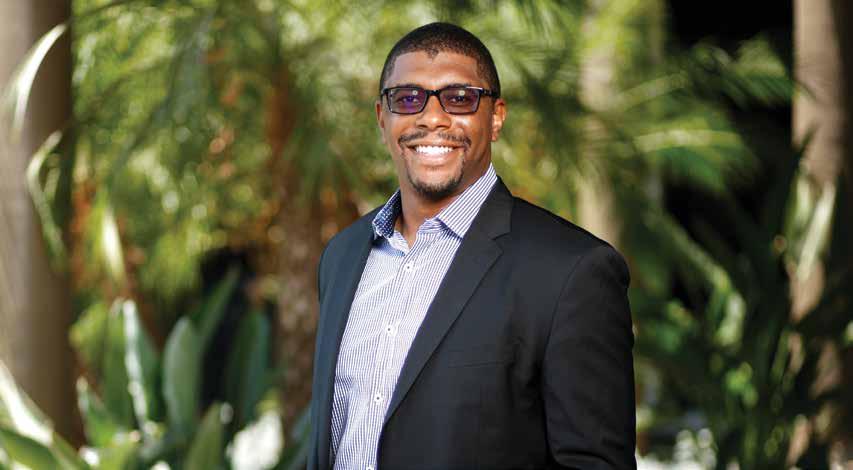
29 Law Quadrangle • Winter 2022
CLIENT MATTERS COMPLETED SINCE 2012 STUDENT HOURS SPENT ON CLIENT WORK SINCE 2012 70% OF CLIENTS ARE STUDENT-LED STARTUPS 1,000+ 20,000+ CLINIC HIGHLIGHTS
Inspired by Friend and Mentor, Alumnus Launches New HBCU Scholarship
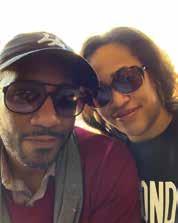
As a first-generation law student, Ronald Falls Jr., ’05, understands the importance of mentorship firsthand, and he takes pride in seizing every opportunity to help others reach their full potential. In this, Falls credits his friend and fellow Michigan Law graduate Rasheeda Creighton, ’02, with providing an example for him to follow. Inspired by their decades-long friendship, Falls recently established a new scholarship fund in Creighton’s honor that will support Michigan Law students who graduated from historically Black colleges and universities, as both he and Creighton did.
Originally from Southern California, Falls attended Morehouse College in Atlanta, where he pursued a degree in mathematics and physics and initially planned for a career in science. Falls was very involved in student government, which is where he met Creighton, who was a year ahead of him at Morehouse’s neighboring school, Spelman College. They became fast friends. Creighton was a Darrow Scholar at Michigan Law when Falls was thinking about his destination for law school, and he credits her with being instrumental in his decision to come to Ann Arbor. During his Preview Weekend visit, where he also attended the Butch Carpenter Scholarship Gala, Creighton introduced Falls to a community that he found welcoming, collegial, and supportive. He emphasizes that having this network of support and mentorship made all the difference for his education.
As Falls made his way through law school, he never lost touch with Creighton, who continued to act as a resource. She provided advice on everything from coursework to clerkships. “It wasn’t just me that she was helping; it was a lot of students. She had the information, and she would share it. I was constantly reminded that she was mentoring and giving back,” says Falls.
After graduating from Michigan Law, Falls hit the ground running in what has been a wide and varied career. After several years in Asia working on mergers and acquisitions, he returned to the United States and reconnected with his former classmates by joining the African American Alumni Reunion Committee in its inaugural year. “I got to learn a lot more about the history and the legacy of the Law School from the perspective of former students who had come from other generations,” he says. “I realized the importance of the Reunion for current African American students, alumni, and future students because a lot of times when people think about some of these institutions, they don’t understand how they fit into it completely.” This realization, as well as his appreciation for his “big sister who did all the right things,” was a large part of his inspiration to establish the HBCU Go Blue Scholarship in honor of Creighton.
“One of the many things Ron and I have always shared is our deep desire to leave a legacy, not just for our children but for future generations. Never did I imagine that he would start a scholarship with my name on it, and I was literally rendered speechless,” says Creighton. “I know firsthand the freedom that comes with not carrying the heavy burden of law school debt, and my hope is that we can grow this scholarship to afford that freedom to Michigan Law students for generations to come.”
As someone who has found himself in a variety of positions, most recently as a venture capitalist and a senior political strategist for a gubernatorial campaign, Falls hopes this scholarship fund will broaden the opportunities available to students. “What types of choices might they make if the economic burden is not so weighty when they leave Michigan? Might they go be public defenders or work in a startup? If there are more students who don’t have to make a decision based completely on economics, I think we’re going to find ourselves in a better place.” —CLP
If you would like to make a contribution to the HBCU Go Blue Fund, please contact Mary Buikema at mbuikema@umich.edu or 734.615.4517.
30 Law Quadrangle • Winter 2022
IMPACT
Longtime Legal History Professor Establishes Fund for LGBTQ Students
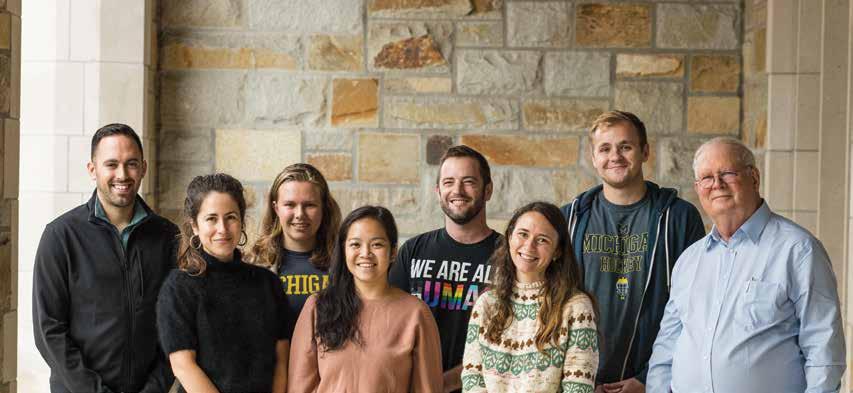
Capping off a five-decade career at the University of Michigan, Bruce Frier, the John and Teresa D’Arms Distinguished University Professor of Classics and Roman Law, has established a scholarship fund that will support LGBTQ students at Michigan Law. Frier has long been an engaged member of the University community and has previously supported many inclusivity initiatives at the Law School, including the Outlaws LGBTQ student organization as well as the Spectrum Fund, which provides financial support to students looking to pursue research, impact litigation, and policy work that advances LGBTQ equality.
“Going back 20 years to the beginning of the millennium, the LGBTQ community was rather small at the Law School, but it’s gradually developed in recent years to become quite a large component of the student body,” says Frier. “That was always something that I wanted to encourage.”
In the early 2000s, Frier led a provostial committee dedicated to studying the climate for LGBTQ students, faculty, and staff at the University. The committee produced a report that was adopted by University administration and for the first time laid out a comprehensive policy to improve conditions for transgender individuals, an accomplishment of which he remains “quite proud.” By establishing this new scholarship, he hopes to make legal education more accessible for LGBTQ students, as well as those who have been previously employed in roles that further queer initiatives.
Frier’s well-established tenure at the University of Michigan began in 1969 after obtaining his PhD in classics from Princeton University. He initially taught within the Department of Classical Studies—where he ultimately served as interim chair—and began a joint appointment with the Law School in 1981, teaching Legal History and Contracts. Frier is an accomplished scholar and has published many books and articles about economic and social history, focusing especially on Roman law. “I had always been interested in law and started to cultivate that interest after I came to Michigan,” he says. “It’s a complicated area and sometimes seems rather remote from that which is normally thought of as law, but I’ve been able to successfully marry two of my greatest passions.”
With plans to retire next year, Frier remains optimistic about the trajectory of the institution that he has been a part of for so long. He hopes that this scholarship will help students be the changemakers who will work to advance civil liberties for all. “I would like to see some of our students work on the law in the state of Michigan itself, and I think that lawyers who are more progressive in their views on LGBTQ issues will play a crucial role in bringing about change,” he says. “The Law School has always been a leader, and I am certain it will continue to be.”—CLP
31 Law Quadrangle • Winter 2022
IMPACT
New Fund Will Bolster International Opportunities at Michigan Law
In 1985, Bufford was chosen to serve as U.S. bankruptcy judge in the Central District of California. Shortly thereafter, he started receiving offers to teach international legal seminars due to his teaching experience, professional credentials, and the foreign language capabilities that he picked up from time spent in Geneva after law school. He became one of six U.S. judges sent to teach a judicial seminar in Romania, which in 1989 was in the process of restructuring its economy and modernizing its laws. Bufford says that this experience put him on the State Department’s “short list” for similar programs in Eastern Europe, and it wasn’t long before he recruited his wife to join him. Metzger’s broad knowledge of commercial and corporate law proved useful in an area of the world that was transitioning away from communism and reorganizing almost all of its businesses.
While serving as a federal bankruptcy judge in Los Angeles, the Hon. Samuel Bufford, ’73, jumped at an opportunity from the U.S. State Department to teach a legal seminar in Eastern Europe following the fall of the Berlin Wall. This set off a chain of events that sent Bufford and his wife, Julia Metzger, AB ’70, to a dizzying number of countries around the world, and it also led the couple to establish a new fund that will support international experiences for Michigan Law students.
The pair first met at The Ohio State University, where Metzger received her law degree and where Bufford taught after graduating from Michigan Law. After they were married, they decided to move to California to practice. Bufford specialized in business law, specifically corporate, bankruptcy, antitrust, and securities. Metzger focused on commercial law, particularly financial institutions, and spent time at the Federal Deposit Insurance Corporation (FDIC). Both emphasize how important their Michigan degrees and connections were to their success. “When we moved to California, I found my Michigan undergrad degree opened more doors than my law degree from Ohio State. The JD qualified me for the jobs, but I wouldn’t have gotten the interview without the Michigan undergrad,” says Metzger, a proud third-generation U-M graduate.

While continuing to practice in California, Bufford and Metzger were itinerant, staying for brief stints in places as widespread as Oman, Ecuador, Korea, and Brazil. They participated in seminars sponsored by the Abu Dhabi Judicial Department, USAID, the International Training Center for Bankers, the International Insolvency Institute, and many other entities. After retiring from practice, the couple took up faculty appointments at Penn State Law, which sent them to Mongolia (the high temperature during their stay was -12°F). Bufford also returned to Romania in 2016, where he taught as a Fulbright Fellow at the University of Bucharest. In their desire to promote opportunities for international study at the Law School, Bufford and Metzger are carrying on a journey that has defined their partnership. The Bufford-Metzger Fund for International Activities at Michigan Law will support international experiential learning for students, including study abroad, international internship or clerkship placements, independent research projects, international moot courts, and the International and Comparative Law Research Scholar program. “Our view is that the international experiences we have had, traveling the world and meeting the people, very much broadened our horizons. We received wonderful benefits in our time, and other people should have that opportunity as well,” says Bufford.
“We see it as a two-way street, both a benefit for the student who gets to travel abroad and also a chance to enhance the University’s outreach and influence,” Metzger adds. —CLP
32 Law Quadrangle • Winter 2022
IMPACT
Bob Fiske, ’55, Inspires Gift to Eponymous Government Fellowship
Inspired by the example of Robert Fiske, ’55, a group of donors has made a $90,000 contribution to the Fiske Fellowship Program at Michigan Law, which encourages young lawyers to enter government service by providing recipients with cash stipends and loan repayment assistance. The gift was made by current and former partners from the white collar practice group at Davis Polk, where Fiske practiced after serving as a U.S. attorney in the Southern District of New York.
“It is a great testament to the fellowship program that my colleagues would make this contribution, and it is an extraordinarily meaningful gift,” says Fiske. “There is more need than ever for highly qualified and highly motivated people with integrity going into government service. In many ways, the program is even more important now than when I started it.”
The donation was made in honor of Fiske’s 90th birthday, and in recognition of the contributions he has made to the legal profession and to the countless lawyers he has mentored throughout his distinguished career. “Those of us at the firm have followed his lead—he worked with us, mentored us, tried cases with us, and set the example of public service,” says one of the donors, who has known Fiske since the early 1980s. “So much great work is done in the public sector, and it needs to get done well. The importance of really good government lawyers can’t be overstated.”
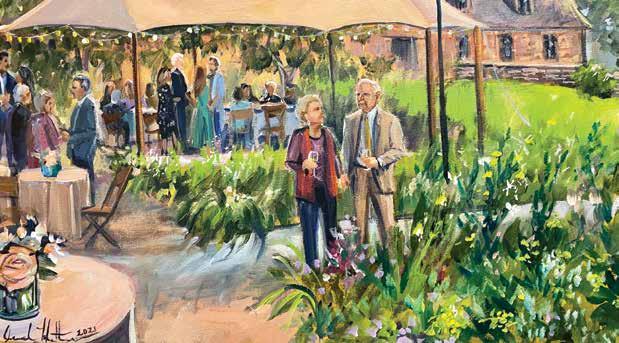
The Fiske Fellowship Program annually selects up to four Michigan Law graduates who are entering government service and provides financial assistance to encourage them to choose public service despite more lucrative opportunities in the private sector. Recipients receive a cash stipend as well as loan repayment assistance to cover all educational loan payments, including undergraduate loans, for the duration of the three-year fellowship.
“The fellowship allows recipients to go into government when they might not be able to afford it otherwise, and the majority of recipients stay in government service long after the assistance ends,” says Fiske. “And those who go into private practice after working in government, as I did, are better lawyers for having had that public-sector experience.”
Third year law students, recent graduates who are serving in clerkships, and alumni in their first postgraduate year of government employment are all eligible to apply for the Fiske Fellowship Program, which was established in 2001 and has awarded 69 fellowships to date. With their gift, the donors have helped to ensure the program will continue to support aspiring public servants for years to come.
“Bob is really one of a kind, and we feel an enduring desire to contribute to the greater good and government service because of him,” says another donor, who has worked with Fiske for more than 25 years. “He is very committed to public service, and to Michigan Law, and it was meaningful to all of us to support two things he holds dear.”
33
—JW
Law Quadrangle • Winter 2022
An artist’s rendering of Bob Fiske’s recent birthday gathering, where his colleagues announced their donation to the program.
Lifelong Friendships
In 2021, Michigan Law held a dedication ceremony for a new garden in the Law Quad, the Jardin St. AntoineFetter, which was made possible by a $1 million gift from Steven M. Fetter, ’79, and his wife, Bonnie K. Kellogg. The garden is located outside of the Lawyers’ Club dining room, and is in honor of Fetter’s cherished friendship with Ted St. Antoine, ’54, the James E. and Sarah A. Degan Professor Emeritus of Law.
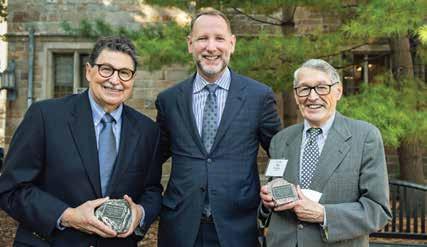
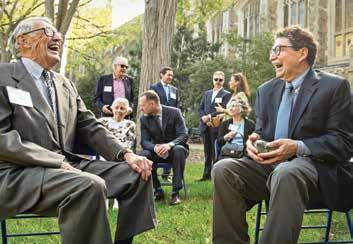
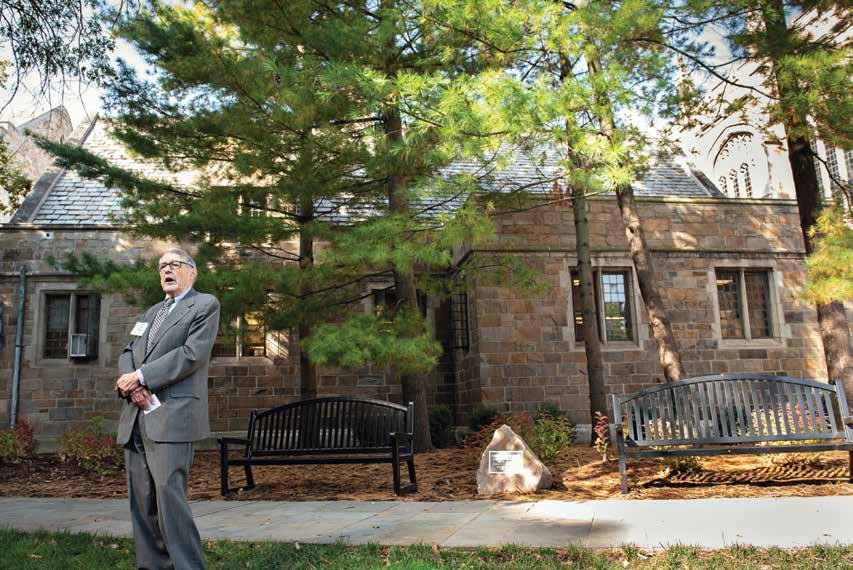

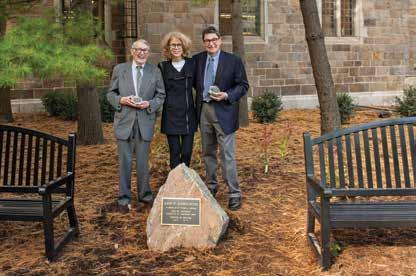
“
This garden doesn’t celebrate any solitary law professor. It doesn’t celebrate any distinguished alumnus. It celebrates a faculty-student relationship. I often recall when I was a student how lucky we were to have this great legal institution in a relatively small town, which encouraged and enabled close faculty-student relationships. That has continued on. The relationships that develop here between faculty and students endure for years. And that is a wonderful tribute to this school.”
—TED ST. ANTOINE,
’54
IMPACT
34
Darrow Recipient Sees Giving As a Way to Pay It Back, and Forward
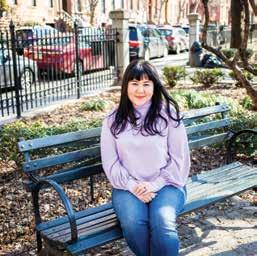
For Charlotta Chung, ’11, receiving Michigan Law’s Darrow Scholarship was not just a financial boon—it also instilled in her a desire to live up to the expectations of those who had invested in her future. Now a transactional attorney in New York City, Chung makes a monthly gift to the Law School Fund as a way to repay the “life changing” investment that others made in her education and career.
Recipients of the Darrow Scholarship—named after renowned trial lawyer Clarence Darrow—are chosen by a faculty committee for their outstanding academic achievements and capacity for leadership.
Chung emphasizes that this scholarship not only helped her succeed in her chosen career path but has also given her an opportunity to help others. “I always felt I was the recipient of not just an opportunity but an expectation as well,” says Chung. “I felt that the scholarship was the Law School telling me that they saw something in me to develop and wanted to help me get there, and I’ve always tried not to forget that. Now that I’m in a position to give back, I want to help the Law School invest in other students.”
Chung has remained an active alumna on a number of fronts, including as a class agent, and directs her donations to the Law School Fund, which she appreciates for its flexibility. “I switched to making a recurring gift so that I didn’t have to think about it, and I knew it would be a consistent amount that the Law School could count on,” she says. “I felt the overall experience I had at Michigan was so important that I wanted to give to the school’s current priorities and support the law school experience generally.”
Through this consistent support, Chung wants to impart the message that it’s never too early to give back. “I try to be open about my philanthropy because sometimes giving is seen as something to do when you’re older or more established. But for me, paying it forward has always been a formative value. Whatever level of giving I could do, even when I still had loans, I made sure to do that because I’ve benefited from someone else’s investment,” she says.
Chung, who has been interested in finance since she learned about bankruptcy law in her 1L year, recently started as counsel at Wilkie Farr & Gallagher LLP in New York, where she represents corporations and private equity firms in financial transactions. —CLP
Recent Gifts
Thomas Schuerrle, LLM ’87, and his wife, Maximiliana, made a gift of $100,000 to the European Alumni Fellowship Fund. Thomas is of counsel at Debevoise & Plimpton LLP in Frankfurt, Germany.
Drew Grabel, ’96, and his family made a gift of $150,000 to establish, at the dean’s request, the Drew Grabel Family Dean’s Discretionary Fund. He is a partner in the New York office of Kirkland & Ellis, where he specializes in corporate law with a focus on private equity investments.
Kevin Costantino, ’00, and his wife, Joanna, made a $50,000 gift to the Law School Fund. Kevin is president at Greenhill & Co. Inc. and also serves as co-head of the firm’s U.S. mergers and acquisitions practice.
Karin Verdon, ’71, documented a bequest of $540,000 to establish the Karin A. Verdon Technology in Legal Education Fund, which will be used to acquire and upgrade technologies for classroom instruction, as well as for use in the clinical law programs. She is a retired labor relations attorney in Denver.
Gordon Devens, ’94, and his wife, Laura, BBA ’88, made an additional gift of $50,000 to the Gordon and Laura Devens Endowed Scholarship Fund. The couple resides with their two children in Darien, Connecticut.
Quinn Emanuel Urquhart & Sullivan, LLP made a gift of $178,500 to establish the Jon C. Cederberg Memorial Scholarship Fund. The gift was made in memory of Jon Cederberg, ’77, former assistant U.S. attorney and partner in the firm’s Los Angeles office. The fund will be used to provide financial assistance to law students who graduated from the University of Michigan with an undergraduate degree—as Cederberg did in 1974—and who express an interest in pursuing a career in trial advocacy.
35 Law Quadrangle • Winter 2022 IMPACT
CLASS NOTES
Herb Kohn, ’63, Receives 2021 Distinguished Alumni Award
By James Weir
Herb Kohn, ’63, a titan of the Missouri legal community for more than half a century, was honored as the 2021 recipient of Michigan Law’s Distinguished Alumni Award at a ceremony in Kansas City.
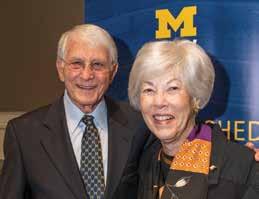
“We are so proud to call Herb one of our own and to present this award to someone who so fully exemplifies the kind of person that the Law School believes in, someone who is dedicated to the law and is held in such high esteem by his peers,” said David A. Breach Dean Mark West in his remarks. “We tell our students from the very beginning that their accomplishments in the world would mean nothing if they’re not leading an authentic life and positively affecting others, and that’s exactly how Herb has conducted his life and career.”
Kohn is senior counsel at Bryan Cave Leighton Paisner in Kansas City, where he is a former member of the executive committee and practices corporate, business, and banking law with a concentration in the areas of acquisitions, financial transactions, and public finance. He previously was a partner at Linde Thomson Langworthy Kohn & Van Dyke PC for nearly 30 years, including five years as chairman of the firm. Earlier in his career, he was the Jackson County Counselor and worked as a clerk in the chambers of the Hon. Harvey M. Johnsen, chief judge of the U.S. Court of Appeals for the Eighth Circuit.
“I am humbled beyond words to be recognized by the school that I love so much, which has not only given me my law degree but also my wife and closest adviser, Nancy. Anything that I have achieved would not have been possible without her support, and I consider her my co-awardee,” says Kohn, who met his wife of 61 years in Ann Arbor. They have two children and five grandchildren.
Known for his prodigious deal making and the ability to captivate any audience, Kohn also has served as a friend and mentor to many. “Over the years Herb has developed hundreds of young lawyers, partially by encouraging them to interact directly with his clients,” said former colleague and friend Lynn S. McCreary, who spoke at the ceremony. “He helped them grow their skill while keeping a steady hand on the wheel, guiding the intricacies of every transaction while he drove other people’s success.”
Kohn has strong ties to Missouri’s political and legal communities and has been engaged with civic endeavors outside of his practice for decades. He has served as chairman for the Missouri Gaming Commission, the Missouri Cancer Commission, the Kansas City Art Institute, the Commission to Study Early Childhood Education in Kansas City, a blue ribbon task force studying Kansas City’s pension plans, the Kansas City Mayor’s Fast Forward Committee, the Kansas City Mayor Kay Barnes’ Transition Task Force in 1999, the board of Shalom Geriatric and Convalescent Center, and the United Way Professional Group. He also was the director of the youth leadership program Missouri Boys State, the Richard and Annette Bloch Cancer Foundation, and the Starlight Theatre, and served as a trustee of the Massachusetts School of Law and the Truman Presidential Museum and Library. He also has been a member of the Civic Council of Greater Kansas City and the finance committee of the Nelson-Atkins Museum of Art.
His previous honors have included the Baron of the Boardroom Award from the Kansas City Metropolitan Bar Association, the Best Rainmaker designation from Missouri Lawyers Weekly, and the 2019 Henry W. Bloch Human Relations Award from the Jewish Community Relations Bureau/American Jewish Committee. A frequent lecturer on the art of deal making, he has authored Elements for an Acquisition and Selling My Business
Presented annually since 2011, the Distinguished Alumni Award is Michigan Law’s highest honor, and recognizes extraordinary alumni whose achievements exemplify the values and ethos of the Law School.
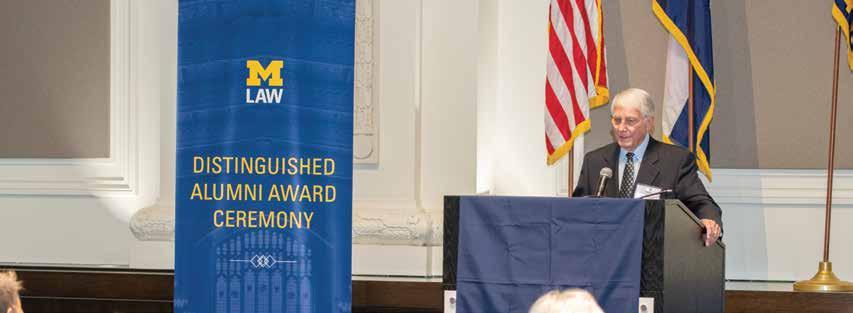
Winter 2022
CLASS NOTES
1973
Seven Michigan Law alumni were honored in June 2021 for being members of the Florida Bar in good standing for 50 years. Gemma B. Allen, ’69, John T. Blakely, ’69, Terrence L. Croft, ’65, and Robert J. Kheel, ’69, were admitted in 1970, and Patrick James Murphy, ’70, Gary Paul Sams, ’69, and Thomas Edward Sliney, ’67, were admitted in 1971.
1963
A. Paul Victor retired in January 2021 after 57 years of practicing law. His journey in the legal field took him to the Department of Justice’s Antitrust Division; associate positions at Kirkland, Ellis & Rowe and Weil, Gotshal & Manges; and partnerships at Weil, Dewey Ballantine, Dewey & LeBoeuf, and, for the last nine years, at Winston & Strawn in New York. He enjoyed teaching stints at Michigan Law and Fordham University School of Law and had a long career in the leadership of the American Bar Association’s Section of Antitrust Law. He notes that he is deeply grateful for the opportunities his Michigan education provided and will continue to enjoy time in New York and in the Hamptons.


1964

John Mogk, an expert on urban and regional development, housing, property, and local government law, was named a Distinguished Service Professor of Law at Wayne State University. This rare classification is used to designate senior faculty members who have made extraordinary contributions outside their disciplines.
1969
John McGonagle, now retired from the position of managing partner of The Helicon Group and from the competitive intelligence profession, wrote his first one-act play, Mirrors. It is one of four category finalists in the Shawnee Original Playwrights Short Play Festival in Pennsylvania. The festival received more than 200 submissions for its three categories.
Donald Shelton was appointed by Michigan Gov. Gretchen Whitmer to the Michigan Task Force on Forensic Science. He also was elected chair of the jurisprudence section of the American Academy of Forensic Sciences and is the current director of the Criminology and Criminal Justice Program at the University of Michigan-Dearborn. Previously, he was a circuit court judge in Washtenaw County for 25 years.
1972
Did you get a new job or a promotion? Were you recognized with an award? Share your news with classmates in an upcoming issue of the Law Quadrangle Email LQNClassNotes@umich.edu or complete the online form at law.umich.edu/classnotes
Edward Ratushny, LLM ’72, SJD ’79, was named an honorary degree recipient from the University of Saskatchewan. This prestigious award is granted to those who have made a significant contribution to their community and Canadian society at large. His career as a law professor and legal author has been complemented by extensive professional experience in the field of public law.
Suzanne G. Mason joined Fox Rothschild LLP in Atlanta as a partner in the firm’s taxation and wealth planning department. She centers her practice on estate administration.
SPRING 2022
REUNION
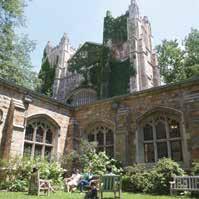
Emeriti, 1970, 1971, 1975, 1976, 1980, 1981, 1985, 1986, 1990, and 1991
JUNE 10–12
1973
Wilhelmina Reuben-Cooke, who passed away in 2019, was renowned for her barrier-breaking career as an attorney, professor, and university administrator, but she first made her mark on history with a simple yet brave and notable act: attending Duke University. Reuben-Cooke was one of five African Americans who broke the color barrier at Duke when they matriculated in 1963; she went on to graduate with distinction. In September 2021, Reuben-Cooke’s undergraduate alma mater named an academic building after her, in recognition of her place in Duke’s history and for her contributions to the institution, including 12 years as a member of the board of trustees. The building dedication was attended by surviving members of her family, including her husband, Edmund Cooke, ’73.
37 Law Quadrangle • Winter 2022
t t t
CLASS NOTES
1975
Stephen Meyer was honored by Sacramento Magazine as a 2021 Top Lawyer in alternative dispute resolution. He is of counsel at Downey Brand LLP.
1981
Kenneth Salazar was confirmed as the latest U.S. ambassador to Mexico. He previously served as the Secretary of the Interior from 2009 to 2013.
1982
Myint Zan, LLM, edited Legal Education and Legal Traditions (Springer Link Publications, 2020). He also is an active adviser in Myanmar for University of Mandalay teams participating in the Philip C. Jessup International Law Moot Court Competition.

1983
Denise J. Lewis has received the 2021 Distinguished Alumna Award from her undergraduate alma mater, Barnard College of Columbia University. The award is in recognition of her professional accomplishments and for her efforts to revitalize underserved urban areas through nonprofit economic development programs and other forms of community investment, particularly in Detroit and Pontiac, Michigan. Before her retirement, Lewis was a senior partner at Honigman in Detroit for nearly four decades, and she served as a member of the management committee and founded the firm’s urban redevelopment practice. Known for handling complex transactions, particularly involving public-private partnerships and mixeduse development, Lewis has represented developers involved in projects all over the country. She has served on the boards of many nonprofit organizations and other civic organizations, including the Detroit Economic Growth Corporation, Detroit Riverfront Conservancy, Invest Detroit, and the McGregor Fund, and was elected to an eight-year term on the Wayne State University Board of Governors, during which she served as both chair and vice chair.

1983
Claudio Visco, LLM, managing partner of the Macchi di Cellere Gangemi studio, will be the first Italian to hold the prestigious role of secretary-general of the International Bar Association. He will serve in the role for a two-year term.
1984
T. Andrew Brown became the 124th president of the New York State Bar Association. He is the founder and managing partner of Brown Hutchinson in Rochester, New York, where he practices civil litigation and employment law. He will serve a one-year term as president.
SPRING 2022
REUNION
Emeriti, 1970, 1971, 1975, 1976, 1980, 1981, 1985, 1986, 1990, and 1991
JUNE
10–12

Kurtis T. Wilder was elected chair of the board of trustees at Interlochen Center for the Arts in Northern Michigan. Previously, he served as first vice-chair and chair-elect. He is a shareholder at Butzel Long in Detroit.
1985
Jeri Looney accepted the general counsel position at Skyryse Inc., a flight operations startup based in El Segundo, California. She joined Skyryse after two years as general counsel at The Spaceship Company and one year as senior legal director at Virgin Galactic.

Stanley Jaskiewicz was appointed editor of the Voice of Experience, the monthly newsletter of the American Bar Association’s senior lawyers division. He is a member at Spector Gadon Rosen Vinci PC in Philadelphia.
1986
Thomas R. Morris, and his son, David (pictured), have established Morris & Morris Attorneys PLLC in Dexter, Michigan. His practice, which was previously located in the Detroit area for 35 years, concentrates on bankruptcy, litigation, insolvency matters, and commercial law.

38
1987
Sheryl Renee Dobson’s artwork was featured in the Katonah Museum of Art’s International Juried Biennial Exhibition in Katonah, New York. As one of 58 artists featured, her work was chosen from 542 entrants.

1988
Charlotte Johnson joined the University of San Diego as its vice president for student affairs. Previously, she served as the vice president and dean of students at Scripps College in Claremont, California.
Michelle Oberman was reappointed to the Katharine and George Alexander Chair for a four-year term at the Santa Clara University School of Law. She is an internationally recognized scholar on the legal and ethical issues surrounding adolescence, pregnancy, and motherhood.
Jaye Quadrozzi was elected as the chair of the Huron-Clinton Metropolitan Authority’s board of commissioners in Southeast Michigan. She is the second woman to serve as chair in the park system’s 81-year history.
1989
Thomas W. Ude Jr. received the Pennsylvania Bar Association 2021 David M. Rosenblum LGBTQ+ Public Policy Award, which honors individuals who have used their position to effect positive change for the LGBTQ+ community and to inspire others to act and promote civil rights and equality.
1990
Jerry Gidner, who has Tourette syndrome, was elected to the board of directors of the Tourette Association of America, the only national nonprofit in the United States assisting those with Tourette syndrome and other tic disorders. He is the director of the Bureau of Trust Funds Administration at the Department of the Interior, which manages and invests funds generated from lands held in trust from Native American tribes.
Edward Sebold has been appointed as general counsel to Kyndryl, IBM’s managed infrastructure services business. He has more than 25 years of expertise in the legal and regulatory issues facing global enterprises and previously oversaw IBM’s global litigation team and network of outside counsel firms.
Colin J. Zick was recognized by Chambers USA for his work in health care law. He is a partner at Foley Hoag LLP in Boston.

1991
Robert A. Brundage joined Bowman and Brooke LLP as a partner in the firm’s San Jose, California, office. A highly regarded appellate lawyer in the automotive and recreational vehicle industry, he has defended many of the world’s largest vehicle manufacturers in product liability litigation.
1993
Donica Varner was named vice president and general counsel at Cornell University. Previously, she served as vice president, general counsel, and secretary at Oberlin College in Ohio.
SPRING 2022
REUNION
1995, 1996, 2000, 2001, 2005, 2006, 2010, 2011, 2015, and 2016
MAY 20 – 22
1994
Mariana M. Long was named the 2020 Federal Librarian of the Year by the Federal Library and Information Network. She is a supervisory reference librarian with the U.S. Department of Justice.
Larry R. Seegull has been recognized in the 2021 edition of Chambers USA: America’s
Leading Lawyers for Business
He is a principal in the Baltimore office of Jackson Lewis PC, where he represents both private and public sector employers in all areas of labor and employment law.


1996
Brad Miller joined Davis Wright Tremaine LLP as a partner in the firm’s media and entertainment practice in Los Angeles. Previously, he served as associate general counsel at Amazon Studios.
39 Law Quadrangle • Winter 2022
CLASS NOTES
Jesse Reyes joined the Boston office of Womble Bond Dickinson as senior counsel. He represents electric transmission companies, independent power producers, energy suppliers, project developers, and investors in disputes and regulatory matters.
Randy Shoemaker joined intellectual property law firm Reising Ethington as a senior attorney in Troy, Michigan. He has nearly 25 years of experience in patent law.
1998
Bushra Malik, outgoing Michigan Chapter Chair of the American Immigration Lawyers Association, celebrated the chapter receiving the AILA Platinum Level Award under her leadership. It is the highest award given to a chapter by the professional organization. She is a shareholder at Butzel Long in Bloomfield Hills, Michigan.
1999
Nada Llewellyn joined Kramer Levin Naftalis & Frankel LLP as chief diversity and inclusion officer, based in New York. Previously she served as chief diversity officer, associate vice president for human resources, and deputy general counsel for St. John’s University.
2000
Alexandra MacKay was recognized by IP Stars as a Copyright Star and a Trademark Star. She is an attorney at Stites & Harbison PLLC.


2001
Joanna Malaczynski-Moore published Silent Winter: Our Chemical World & Chronic Illness (Algora Publishing, 2021). Using her prior experience as a sustainability entrepreneur, environmental consultant, conservation advocate, and consumer protection and antitrust attorney, she explores the relationship between the use of toxic chemicals in consumer products and our rising rates of chronic illness.
2002
Andrea Clark was honored by Sacramento Magazine as a 2021 Top Lawyer in energy and natural resources. She is a partner at Downey Brand LLP.
2004
Jennifer Reddien joined Venable LLP as its inaugural chief diversity and inclusion officer, based in Washington, D.C. Prior to joining Venable, she served as the director of diversity and inclusion at Haynes and Boone LLP in Dallas.
Elizabeth “Liza” Rios was named deputy state court administrator by the Michigan Supreme Court. Previously, she served at the Michigan Advocacy Program where she supervised a 40-person staff at Legal Services of South Central Michigan.
Laura Varela-Addeo became the head of the newly formed Immigrant Affairs Commission in Anne Arundel County, Maryland, in 2020. Prior to the commission, she worked as a civil rights attorney for 14 years, specializing in immigrant services in the Washington, D.C., area.
SPRING 2022
REUNION

1995, 1996, 2000, 2001, 2005, 2006, 2010, 2011, 2015, and 2016
MAY 20 – 22
2005
Reena Bajowala was selected as a member of the 2021–2023 class of the American Bar Association Business Law Fellows Program. The program provides a diverse array of lawyers with the opportunity to engage in professional development opportunities within the business law section. She is a partner at Ice Miller Strategies LLC in Chicago.
2006

Pamela Grewal was promoted to special trial attorney in the IRS Office of Chief Counsel’s National Strategic Litigation Program. She has 15 years of experience in federal tax controversy matters with the Department of Justice and the IRS Office of Chief Counsel.

Mark Jefferson was named the inaugural assistant dean for diversity, equity, and belonging at the University of Virginia School of Law. Previously, he served as assistant dean of community engagement and equity at Harvard Law School.
James C.D. Wahls was named senior vice president of programs and initiatives at Mission Investors Exchange, an impact investing network for foundations. Most recently, he served as a portfolio manager of social investments for the Annie E. Casey Foundation in Baltimore.
40
The Disruptor Using Data to Shake Up the Dance World
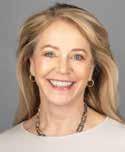
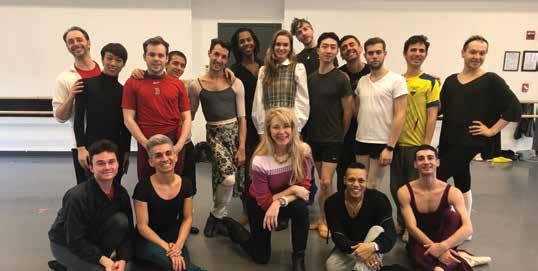 By Chelsea Liddy Pivtorak
By Chelsea Liddy Pivtorak
Elizabeth Yntema, ’84, did not originally intend to start a nonprofit organization, but when the lifelong dance enthusiast realized how rare it is for women to assume positions of power in ballet, there was no stopping her from trying to shift the imbalance. Despite thinking of herself as a “reluctant entrepreneur,” Yntema is the driving force behind the Dance Data Project® (DDP), a genderfocused research nonprofit that aims to shift the status quo in classical dance, specifically ballet.
Yntema says that her experience at the Law School, where she first waded into tough subject areas, helped prepare her to launch the initiative. As a law student, she received the Jane L. Mixer Memorial Award—an annual prize that recognizes outstanding contributions to advance social justice—for organizing a controversial conference on pornography and the First Amendment, which first brought Catherine MacKinnon, now the Elizabeth A. Long Professor of Law, to lecture on campus. “With DDP, no one wanted to engage on gender equity, but Michigan Law gave me the framework to keep pushing for system-wide answers,” she says.
Yntema has been interested in classical dance ever since childhood ballet classes, and she has since become involved in the ballet world as a philanthropist—and a disruptor. She founded DDP in 2015 and helms a team of researchers, interns, fellows, and other staff members who are all committed to advancing equity through data analysis, advocacy, and programming. “I kept looking around and thinking, ‘Well, somebody has got to be doing this work,’ but nobody was looking at the numbers in a consistent way that created longitudinal yearto-year statistics,” Yntema says. “As long as no one knew the numbers, those benefiting from the status quo could continue to ignore the problem. DDP started at my kitchen table as an Excel spreadsheet, but it’s grown so fast from there. We now offer extensive resources geared to help future female leaders globally.”
Classical dance is big business, with expenditures by the 50 largest American ballet companies totaling more than $660 million in 2019, according to DDP. Yntema states that it is not uncommon to see ratios of up to 20 girls to one boy in lowerlevel classes. Similarly, industry experts have confirmed that it is the norm for 70 percent of audience members and donors to be women, but much of the decision making still lies with the men who operate and direct the companies. Approximately 70 percent of artistic directors at the 50 largest American ballet companies are men, and DDP’s research has demonstrated that women earn an average of 63 cents for every dollar their male counterparts receive as artistic directors. Internationally, DDP has found that of 175 ballet companies from 56 different countries, 33 percent of artistic directors are female.
A significant number of the largest ballet companies are currently seeking new leadership, something that is akin to “electing six to eight new popes” according to Yntema—who also notes that “it’s about as open a process as the College of Cardinals sequestered in the Vatican.” DDP is preparing to launch an advocacy campaign to promote more transparency in the selection process of artistic directors. The organization also maintains a comprehensive index of women leading in dance through both creative and administrative roles. “One of the things that I get pushback about is ‘why ballet?’’’ says Yntema. “What we are doing at DDP doesn’t just challenge the ballet world; this lens can be applied not just to classical dance, which is one of the most conservative art forms, but to all performing arts and the entertainment field in general.”
With the Dance Data Project®, Yntema seeks not only to change the culture of ballet but also to defy expectations for women in their 60s. “One message that I would really like to get through, particularly for women who have not pursued a linear, or more traditional, career, is you’re not done yet. You’re not done until you decide you’re done, and it doesn’t all have to make sense at the time. People have told me no at almost every single juncture. You just have to ignore them and keep on going and learning.”
41 Law Quadrangle • Winter 2022
CLASS NOTES
William Tran was promoted to senior vice president, business and legal affairs and production risk, at ViacomCBS.
2007

Shawn A. Strand joined Varnum LLP as a partner in Ann Arbor. An experienced tax attorney with a focus on corporate and partnership taxation issues, he previously served at Honigman LLP.


2008
Chase Cantrell, as part of Speramus Partners LLC, opened Detroit’s first Blackowned brewery, 734 Brewing Company. He is the founder of Building Community Value Detroit, a program that teaches residents how to become neighborhood developers.
Christopher D. Porter was named co-managing partner of the Houston office of Quinn Emanuel Urquhart & Sullivan LLP. As a trial lawyer, he focuses his practice on business disputes, including breach of contract, trade secret claims, business torts, and antitrust disputes.
2010
Michael Allers joined Gunderson Dettmer Stough Villeneuve Franklin & Hachigian as a corporate partner in the firm’s San Francisco office. A transactional lawyer, he was most recently a partner at Kirkland & Ellis.
Ofilio J. Mayorga, LLM, was named to the 2021 list of rising stars in the international arbitration category by Law360. He is an international associate at Foley Hoag LLP in Washington, D.C.
2011
Sarah L. Cylkowski was named to Benchmark Litigation’s 2021 “40 & Under Hot List,” which lists the most talented earliercareer litigation attorneys in the United States and Canada. She is a member of the litigation and alternative dispute resolution practice group at Bodman PLC in Detroit.
Matt Rupp joined Troutman Pepper as a partner in the firm’s corporate practice group, based in Chicago. He most recently served as a partner at McDermott Will & Emery.
2012
Jonathan Fombonne was appointed first assistant county attorney in Harris County (Houston), Texas, where he oversees all litigation, enforcement, and regulatory work. Previously, he was a partner at Kirkland & Ellis.
2013
Terrill A. Wilkins was promoted to named partner at Abrahamson Rdzanek & Wilkins LLC in Chicago. He counsels and represents individual employees in the private sector on a range of employment issues.
2014
Michael Farrel joined the Houston office of Chamberlain Hrdlicka as an associate in the firm’s tax planning and business transactions practice, where he advises corporations, partnerships, and limited liability companies on the federal income tax aspects of business transactions.
Devon C. Holstad joined Minneapolis-based Winthrop & Weinstine PA as an associate in the firm’s business and commercial litigation practice.
2015
SPRING 2022
REUNION
1995, 1996, 2000, 2001, 2005, 2006, 2010, 2011, 2015, and 2016
MAY 20 22
Danielle F. Bass joined Wilson Sonsini Goodrich & Rosati in the firm’s technology transactions practice group. Her practice focuses on transactional matters involving information technology, media, and intellectual property, with an emphasis on commercial relationships.
2017
Fiona Carmody joined Hoguet Newman Regal & Kenney as an associate in New York. She previously served at Gibson, Dunn & Crutcher LLP and represents individuals, law firms, financial institutions, and other companies in civil and white-collar criminal litigation, investigations, and arbitrations.
2018
Dmetri Culkar joined the Greenspun Corp. as an associate general counsel in Henderson, Nevada. Previously, he served as an associate at Holland & Hart LLP in Las Vegas.
2019
Hetali Lodaya was one of 16 law students chosen for the 2021 Law Program of the Fellowships at Auschwitz for the Study of Professional Ethics. The program provides a historical lens to engage early-stage legal practitioners in five fields in an intensive course of study focused on contemporary ethical issues in their profession.
42 Law Quadrangle • Winter 2022
Dean Terrance Sandalow
Terrance “Terry” Sandalow, who served as dean of Michigan Law from 1978 to 1987 and was a member of the faculty for 34 years, died at his Washington, D.C., home on January 29, 2022. He was 87.

A native of Chicago, Dean Sandalow received his bachelor’s and juris doctor degrees from the University of Chicago in 1954 and 1957, respectively. He was the first in his family to attend college, and after graduating from law school he served as a law clerk for the Hon. Sterry W. Waterman of the United States Court of Appeals for the Second Circuit and for Associate Justice Potter Stewart of the United States Supreme Court.
Sandalow practiced law in Chicago before beginning his academic career in 1961 at the University of Minnesota Law School. He joined the faculty of the University of Michigan Law School in 1966 as professor of law and was named the Edson R. Sunderland Professor of Law after his deanship ended in 1987. A respected scholar who specialized in constitutional law and theory, as well as local government, Sandalow was well known for both his love of the Law School and for his spirit of inquiry. As he once told The New York Times, “You come to Ann Arbor if you’re curious, if you’re committed to the intellectual life.’’
He retired from active faculty status in 2000, after a distinguished career of teaching, administration, and research. “I always regarded Terry as the intellectual leader of my generation on the faculty. I didn’t always agree with Terry’s answers to some of the major issues that came before us—but I always agreed with his questions. One could not have asked for a more ardent exponent of the life of the mind,” says friend and former colleague Ted St. Antoine, ’54, the James E. and Sarah A. Degan Professor Emeritus of Law.
Sandalow was the co-author of a path-breaking casebook, Government in Urban Areas. He was widely published on topics including the role of the Supreme Court, federalism, constitutional interpretation, and judicial review. During his tenure as dean, the Smith Library addition—revolutionary because it was underground—was built. His tenure also saw the expansion of the Law School’s global footprint, with the establishment of the Michigan Journal of International Law in 1979 and the launching of the Bates Overseas Fellowship program in 1982.
Sandalow was preceded in death by his wife of nearly 70 years, Ina, in 2020. He is survived by his children, David, Marc, and Judith; daughters-in-law, Holly and Marcie; seven grandchildren; multiple great-grandchildren; and five siblings.
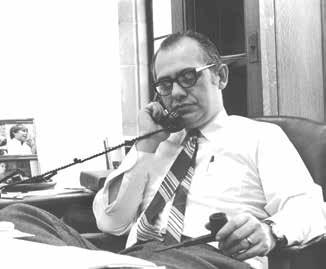
43
FACULTY
REMEMBERING
REMEMBERING FACULTY
Professor Douglas A. Kahn
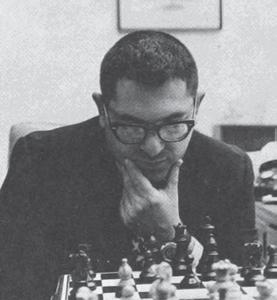
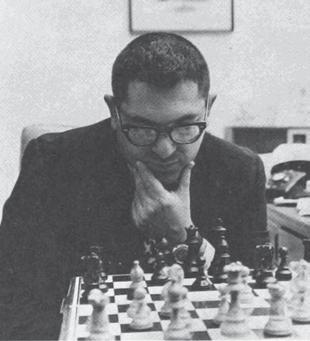
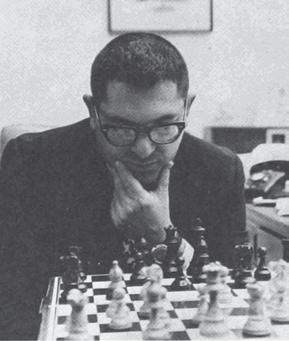
Douglas A. Kahn, the Paul G. Kauper Professor Emeritus of Law, died on October 22, 2021, at his home in Tallahassee, Florida, at the age of 86. He was the longest teaching faculty member in Michigan Law history and a devoted instructor and champion of generations of students.
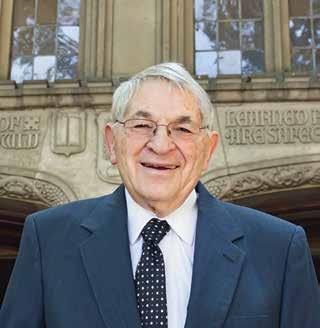
Known for his distinctive laugh and love for a spirited argument, Kahn joined the faculty in fall 1964 and taught full time for 52 years. He specialized in the Internal Revenue Code and was a prolific scholar who co-authored two casebooks as well as several textbooks and articles on a variety of tax-related topics. Throughout, teaching remained Kahn’s true passion. He was a visiting professor at several esteemed law schools during his career, including Stanford and Duke. When asked why he stayed at Michigan when he had received offers from other schools, he once said, “I have never had any group of students that I have enjoyed as much as the ones that I’ve had here.”
The feeling was mutual, since it was not unusual for Kahn’s students to develop a professional interest in the tax code— including his own son, Jeffrey, who graduated from the Law School in 1997 and now teaches federal taxation law at Florida State University.
He also made an impression on other members of the Law School faculty. “When Doug expected his students to master the tax laws, they loved him for it. He was a brilliant teacher and a fantastic colleague, especially to a young tax professor just starting out in the business,” says Kyle Logue, the inaugural chairholder of the Douglas A. Kahn Collegiate Professorship. “I could not have made it through those early years of teaching without his patient and generous advice. When I found myself in a disagreement with him in a faculty meeting or debating with him in the faculty lounge, I was always impressed by his honesty, fearlessness, and overall intelligence, as well as by how quickly he seemed to forget our disagreements. He was an excellent mentor and good friend. He will be sorely missed.”
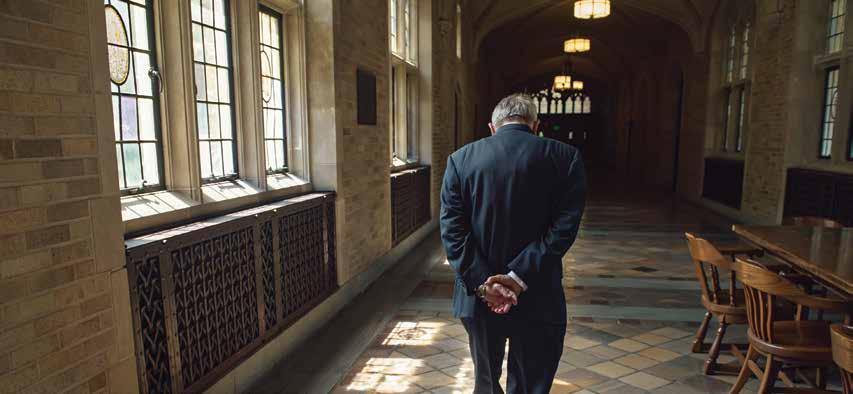
Kahn retired in 2016, an occasion that was marked by the U-M Board of Regents with the creation of the professorship in his name. Additionally, in appreciation of Kahn’s decades of service, a close friend and former student established the Douglas A. Kahn Scholarship Fund; Kahn later documented a bequest to the fund himself, noting that Michigan Law is “much closer to my heart than anywhere else. It is where I want to leave something after my passing to give back to the institution that has given me so much.”
Born in Charlotte, North Carolina, Kahn graduated from the University of North Carolina and The George Washington University Law School. Prior to his academic career, Kahn practiced in Washington, D.C., and served as a trial attorney with both the
Yale Kamisar, a towering, beloved figure in the Law Quad and a nationally renowned scholar of constitutional law, died on January 30, 2022, in Ann Arbor. He was 92.

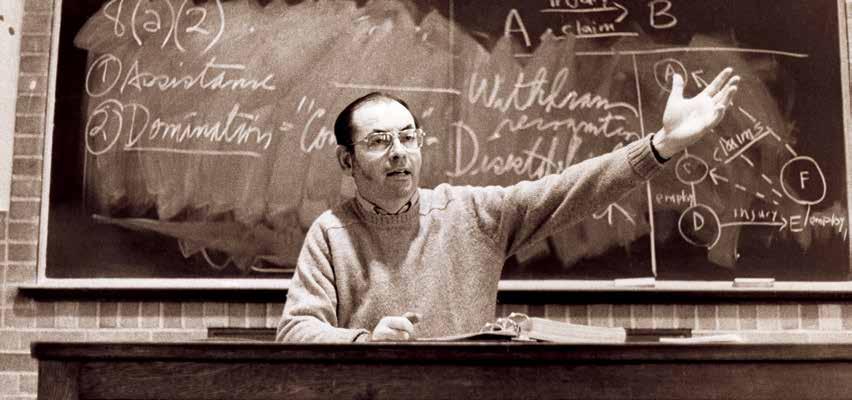
Kamisar, the Clarence Darrow Distinguished University Professor of Law Emeritus and Professor Emeritus of Law, was raised in the Bronx, New York, and attended New York University and Columbia Law School as a first-generation college graduate. (His time at Columbia was interrupted by service in the Korean War, for which he was awarded a Purple Heart.) After law school, he joined Covington and Burling as an associate. He went on to teach at the University of Minnesota Law School before joining the Michigan Law faculty in 1965, where he taught and mentored Michigan Law students for more than a half century.
“Yale was larger than life in so many ways. If you read through the many tributes that were written when he retired, you will learn stories about Yale the brilliant scholar; Yale the teacher; and Yale the loud, intimidating, auto provocative violator of personal space. And you will also learn that Yale was so much more than all of those things. He was an incredibly kind and generous soul. He read every draft someone sent him, responded to every phone call or email, and regularly gave of his time to help others. I remember when I first learned about his service in the Korean War and asked him about it. He downplayed it and said he was just doing his part because that is how he thought about public service—as just doing his part. The world is a better place because Yale was in it,” says Eve Primus, ’01, the Yale Kamisar Collegiate Professor of Law. “I will always cherish my memories of him. He meant so much to the criminal procedure world, to this institution, and to me.”
Often referred to as the “father of Miranda” for the influence his writing had on the landmark Supreme Court case Miranda v. Arizona, his scholarship was cited in more than 30 additional Supreme Court
rulings and has shaped generations of scholars in the fields of constitutional law and criminal procedure. “The term ‘giant’ is often overused even if kindly meant,” says Ted St. Antoine, ’54, the James E. and Sarah A. Degan Professor Emeritus of Law. “But Yale was indeed a giant, the country’s foremost constitutional criminal law proceduralist.”
Kamisar is the author of Police Interrogation and Confessions: Essays in Law and Policy and co-author of Criminal Justice in Our Time and The Supreme Court: Trends and Developments (five annual volumes). He also co-authored two widely used casebooks: Modern Criminal Procedure: Cases, Comments & Questions, all 10 editions; and Constitutional Law: Cases, Comments & Questions, all nine editions. In addition, he wrote numerous articles on police interrogation and confessions, right to counsel, search and seizure, and euthanasia and assisted suicide, and he is widely quoted on these subjects.
Kamisar is survived by his wife, Joan; his sons, David, Gordon, and Jonathan; his daughters-in-law, Denise, Karen, and Stacy; four grandchildren; and two sisters.
ONLINE EXTRA Read more about the life of Yale Kamisar in “The Warrior Scholar,” part of the Michigan Heritage Project. heritage.umich.edu/stories/the-warrior-scholar
45
Professor Yale Kamisar
The Hon. Avern Cohn, ’49
The Hon. Avern Cohn, ’49, who served for 40 years on the bench of the U.S. District Court for the Eastern District of Michigan, died on February 4, 2022. He was 97.
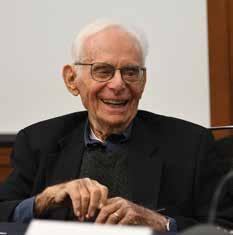
Known for his intellect, wit, and temper, Cohn was appointed by President Carter in 1979. He retired in 2019 at the age of 95.
“Judge Cohn’s super power was his curiosity. He read voraciously, and he would send you articles about topics you had discussed with him weeks earlier,” says Barbara McQuade, ’91, a former U.S. attorney for the Eastern District of Michigan who is pictured with Cohn below. “No matter was too small to be worthy of his attention. I recall a time when a lawyer before him remarked that his case was not very important. The judge replied that the case was the most important thing in the world to him at that moment.”
Cohn grew up in Detroit and enrolled at the Law School in 1946 without an undergraduate degree through a loophole for veterans with some college credits. After graduating, he worked for his father, Irwin Cohn, ’17, a founding partner of Honigman Miller Schwartz & Cohn in Detroit.
Cohn served on the Michigan Social Welfare Commission, the Michigan Civil Rights Commission, and the Detroit Board of Police Commissioners. His appointment to the federal bench fulfilled a lifelong dream. “If you’re committed to the profession, becoming a federal judge, in my view, marks the epitome of achievement,” he said in a 2013 interview for the Law Quadrangle
He was careful to say that he got “great satisfaction” from his work. “You can’t love this job because sometimes you do things you’re required to do, things that you’re not happy with,” he noted in the 2013 Law Quadrangle story, citing as an example having to impose a criminal sentence as required by law, with no flexibility. “If the family is in the courtroom and hears you impose a criminal sentence of some severity, and then later were to hear you say, ‘I love my job,’ they would say, ‘That son of a bitch,’ ” he said.
Cohn presided over several high-profile cases, and some of his rulings were controversial. Among his most memorable cases was Doe v. University of Michigan in 1989; his decision to strike down U-M’s anti-hate speech code because it violated the First Amendment influenced similar regulations on college campuses around the country. Another case involving his alma mater was United States v. Jake Baker in 1995, in which a student fantasized on the Internet about raping, torturing, and killing women. Cohn dismissed the charges, saying there was no evidence he would act and his writings were protected free speech.
Over the years, Cohn supported the Law School by endowing a professorship in his father’s name and establishing the Cohn Summer Fellowship, which encourages Michigan Law students to get involved in community service. “I think lawyers have a community obligation,” Cohn said in 2013.

He is survived by his wife, Lois; his children, Sheldon Cohn, Leslie Magy, and Thomas Cohn; his stepchildren, Lisa Pincus and Julie Pincus; seven grandchildren; and two great-grandchildren. He was preceded in death by his first wife, Joyce.
ONLINE EXTRA This obituary draws from a profile of Judge Cohn in the fall 2013 issue of the Law Quadrangle. Read the original story in its entirety at lawumi.ch/CohnAt89
46 Law Quadrangle • Winter 2022 IN MEMORIAM
1940s
Robert H. Darden, ‘47 08/15/2021
Charles A. Morgan, ‘47 11/07/2021
Joseph W. Morris, LLM ‘48, SJD ‘55 11/11/2021
Albert R. Dilley, ‘49 06/01/2021
Richard L. Gilbert, ‘49 01/14/2021
David R. Lawson, ‘49 09/15/2021
William J. Schrenk, ‘49 01/23/2021
Claire S. Thomas, ‘49 12/09/2020
1950s
David F. Babson, ‘50 03/30/2020
Herbert E. Hoxie, ‘50 04/02/2021
John E. McDonald, ‘50 12/24/2020
John A. Nordberg, ‘50 03/12/2021
Robert A. Smallman, ‘50 07/11/2021
Richard A. Bell, ‘51 04/09/2021
Burton B. Hendricks, ‘51 01/09/2021
Harry A. LeBien, ‘51 9/21/2021
John L. Naylor, ‘51 05/23/2021
J.C. W. Tattersall, ‘51 07/11/2021
William A. Clark, ‘52 10/01/2021
James A. Kendall, ‘52 05/12/2021
Richard P. McManus, ‘52 08/23/2021
Marvin I. Wolf, ‘52 05/13/2021
David H. Daugherty, ‘53 05/09/2021
Robert N. Hammond, 53 10/01/2021
Clarence L. Hudson, ‘53 07/13/2021
Robert T. Wall, ‘53 06/21/2021
Harold A. Ruemenapp, ‘54 03/01/2021
William J. Balgooyen, ‘55 09/29/2021
John P. Daley, ‘55 09/20/2020
Donald F. Oosterhouse, ‘55 08/09/2001
Vernon J. Andrews, ‘56 02/25/2021
William F. Anhut, ‘56 10/23/2021
Harland M. Britz, ‘56 05/10/2021
George F. deClaire, ‘56 02/20/2021
Harold H. Plassman, ‘56 05/05/2021
Thomas P. Kelly, ‘57 12/19/2020
Robert E. Lawson, ‘57 10/07/2021
Frederick Mahan, ‘57 08/13/2021
Rudolf M. Planert, ‘57 07/18/2021

Thomas F. Quinn, ‘57 04/08/2020
Ronald G. Zollars, ‘57 09/22/2021
Byron J. Cook, ‘58 09/18/2021
Joseph C. Fabian, ‘58 09/16/2021
James A. Humphreys, ‘58 09/13/2021
Stuart R. Lefstein, ‘58 12/26/2020
Robert J. Stewart, ‘58 02/10/2021
Paul H. Townsend, ‘58 10/31/2021
Theodore M. Utchen, ‘58, LLM ‘59 03/04/2021
Peter Corcoran, ‘59 10/21/2021
Bernard W. Levine, ‘59 09/25/2021
1960s
Bruce L. Bower, ‘60 06/16/2021
Thomas L. Griem, ‘60 05/27/2020
Peter G. Rich, ‘60 03/09/2021
William T. Tyson, ‘60 04/11/2021
John A. Griffin, LLM ‘61 07/28/2021
Michael Klynn, ‘61 09/01/2020
Ian C. McLeod, ‘61 08/30/2021
H. Meade Summers, ‘61 05/26/2021
George F. Thompson, ‘61 04/02/2021
Donald J. Walbridge, ‘61 12/18/2020
Jerry A. Fullmer, ‘62 04/26/2021
Richard A. Hyde, ‘62 10/31/2021
Robert L. Metzger, ‘62 02/01/2021
Joseph Murray, ‘62 04/13/2021
Dale Park, ‘62 02/21/2021
Jerome M. Salle, ‘62 06/24/2021
John B. Schuyler, ‘62 10/26/2021
Reed F. Steele, ‘62 10/20/2021
Arthur V. Brooks, ‘63 07/05/2021
Anthony E. Efremoff, ‘63 06/16/2021
Dennis D. James, ‘63 02/07/2021
Richard K. Snyder, ‘63 01/23/2021
Casper O. Grathwohl, ‘64 06/17/2021
Ira G. Harris, ‘64 04/07/2021
Robert M. Kroenert, ‘64 12/12/2020
Donald A. Pierce, ‘64 03/12/2021
George A. Shelburne, ‘64 02/15/2021
Peter C. Bomberger, ‘65 09/01/2021
Shirley Z. Johnson, ‘65 07/09/2021
Donald C. Morgan, ‘65 03/26/2021
Donald D. Skinner, ‘65 09/06/2020
R. Malcolm Cumming, ‘66 10/01/2021
William E. Doster, ‘66 05/12/2021
William C. Runyon, ‘66 10/27/2021
Thomas A. Bengtson, ‘67 05/20/2021
Lon Foster, ‘67 08/17/2021
Richard A. McDonough, ‘67 03/31/2021
Edward H. Powers, ‘67 07/14/2021
William J. Stiner, ‘67 08/04/2021
John T. Svendsen, ‘67 03/18/2021
Joseph F. Bartley, ‘68 10/10/2021
Elden W. Butzbaugh, ‘68 02/17/2021
Jean L. King, ‘68 10/09/2021
John H. Logie, ‘68 08/04/2021
Jack R. Zerby, ‘68 08/17/2021
John E. Dewane, ‘69 10/14/2021
William R. Dickey, ‘69 07/02/2021
1970s
David A. Goldstein, ‘70 03/13/2021
Robert J. Lewis, ‘70 07/16/2021
Warren H. Mueller, LLM ‘70 03/23/2021
Mary K. Kane, ‘71 06/03/2021
Stephen Hyatt, ‘72 03/18/2021
Kenneth A. Kraus, ‘72 10/12/2021
Stephen R. Wright, ‘72 01/04/2021
Jack E. Boynton, ‘73 09/30/2021
Fernando C. Gomez, ‘73 10/24/2021
Robert R. Maxwell, ‘73 02/03/2021
David H. Miller, ‘73
Harry J. Sher, ‘73 04/03/2021
W. Lawrence Joachim, ‘74 04/22/2021
David C. Bergmann, ‘75 09/08/2020
Jim B. Johnson, ‘75 08/03/2021
David R. Peterson, ‘75 04/01/2020
Thomas L. Gruich, ‘76 01/22/2021
David B. Stein, ‘76 10/03/2021
Jon C. Cederberg, ‘77 05/19/2021
Michael J. Herbert, ‘77 12/23/2020
Mark M. Rossow, ‘78 03/24/2021
William J. Davis, ‘79 06/01/2020
Julie P. Neerken, ‘79 08/04/2021
1980s
James B. Jensen, ‘80 10/31/2021
Margaret B. Kiernan, ‘81 05/29/2021
Anne M. Burns, ‘87 08/03/2021
Paul F. Beggs, ‘87 02/23/2021
1990s
John P. Sieger, ‘94 03/21/2021
Claudette C. Greene, ‘95 08/27/2021
2000s
Lloyd J. Lemmen, ‘00 08/16/2021
Hannah M. Taylor, ‘20 06/07/2021
IN MEMORIAM
CLASS NOTES
CLOSING
The Crease Court
The Crease Ball was an annual event at the Law School for much of the 20th century, and was once described in a 1958 issue of the (now defunct) student newspaper Res Gestae as “the focal event for the weekend traditionally given over to hell raising before finals.” This isn’t to suggest that there wasn’t a more altruistic purpose: proceeds went to an annual scholarship and to the Case Clubs, the predecessor to today’s clinical program. The event featured drinks and dancing, friendly ribbing of professors, and musical performances, including from the Psurfs, the Law School’s vocal group of the era.
The Law Quadrangle recently received a letter from a daughter of Samuel R. Searing, who graduated from the Law School with an LLB in 1948 after receiving his BA and MA from U-M in 1939 and 1940. “I thought you might be interested in this tongue-in-cheek invitation to the Crease Ball,” she writes. “It’s addressed to my mother, Dorothy Jean Meeks Searing, BA ’47. Sam and Jean were from the same hometown, Lockport, New York, but due to a five-year age difference, they didn’t meet until they were both students in Ann Arbor. Their studies were interrupted by World War II. At the conclusion of the war they married and returned to Michigan to finish their degrees.”
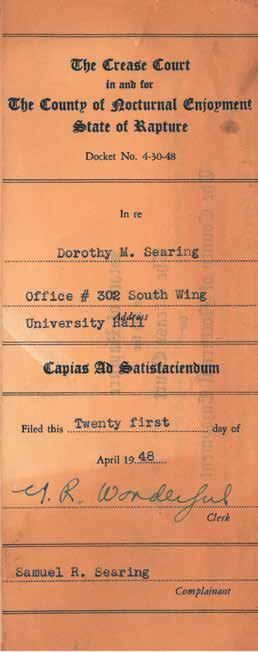
The “filing” was signed by U.R. Wonderful, Clerk of Crease Court, and it would appear the judge ruled in the complainant’s favor—Jean and Sam were married for 36 years, until Sam’s death in 1982.

48 Law Quadrangle
The
University of Michigan Law School
Volume 65, Number 1 WINTER 2022
Copyright © 2022
The Regents of the University of Michigan
All rights reserved.
Law Quadrangle (USPA#144) is issued by the University of Michigan Law School. Postage paid at Ann Arbor, Michigan.
Publication Office: Law Quadrangle, University of Michigan Law School, Ann Arbor, MI 48109-3091. Published twice a year.
Postmaster, send address changes to: Editor, Law Quadrangle
University of Michigan Law School 701 South State Street Ann Arbor, MI 48109-3091
Class
Writers: Chelsea Liddy Pivtorak, Kate Muelemans, Peg Schreiner, James Weir, Ian Williams
Photographers: Olivia Gardella, Sam Hollenshead, Leisa Thompson Photography, Lon Horwedel Photo, and Joseph Park
Printing: University Lithoprinters, Ann Arbor, Michigan
Non-alumni readers should address:
Editor Law Quadrangle
701 South State Street Ann Arbor, MI 48109-3091 Fax: 734.615.4277 Email: For Class Notes –LQNClassNotes@umich.edu For other communications –LQNGeneral@umich.edu
If you are a Law School graduate, please send your change of address to:
Law School Development and Alumni Relations
701 South State Street Ann Arbor, MI 48109-3091 Phone: 734.615.4500 Fax: 734.615.4539 Email: jteichow@umich.edu
The Regents of the University of Michigan
Jordan B. Acker, Huntington Woods Michael J. Behm, Grand Blanc
Mark J. Bernstein, Ann Arbor
Paul W. Brown, Ann Arbor Sarah Hubbard, Okemos Denise Ilitch, Bingham Farms
Ron Weiser, Ann Arbor
Katherine E. White, Ann Arbor
Mary Sue Coleman, ex officio
The University of Michigan, as an equal opportunity/affirmative action employer, complies with all applicable federal and state laws regarding nondiscrimination and affirmative action. The University of Michigan is committed to a policy of equal opportunity for all persons and does not discriminate on the basis of race, color, national origin, age, marital status, sex, sexual orientation, gender identity, gender expression, disability, religion, height, weight, or veteran status in employment, educational programs and activities, and admissions. Inquiries or complaints may be addressed to the Senior Director for Institutional Equity, and Title IX/Section 504/ADA Coordinator, Office for Institutional Equity, 2072 Administrative Services Building, Ann Arbor, Michigan 48109-1432, 734.763.0235, TTY 734.647.1388, institutional.equity@umich.edu. For other University of Michigan information call 734.764.1817.
Chief Communications Officer: Michelle Rodgers
Editor: James Weir
Notes Editor: Chelsea Liddy Pivtorak Designer: Tish Holbrook Digital Designers: Jocelyn Gotlib and Alex Lee
4000 Jeffries Hall, 701 S. State St. Ann Arbor, Michigan 48109-3091
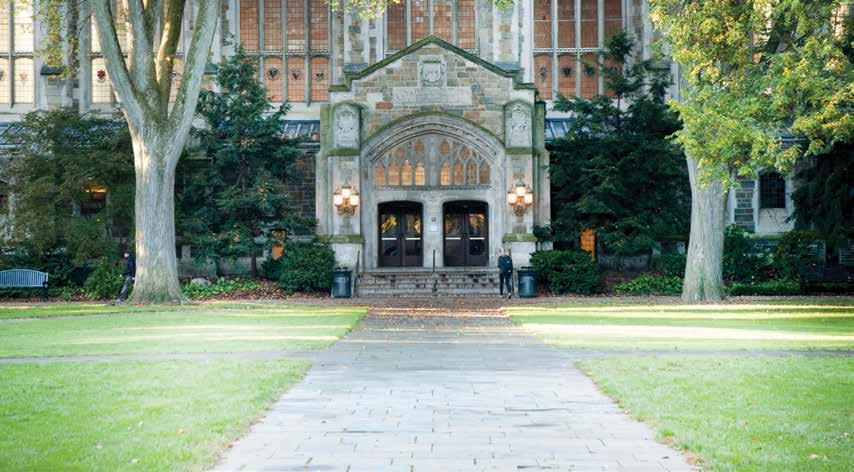
INTRODUCING
The Office of Development and Alumni Relations and the Office of Career Planning have teamed up to launch Michigan Law Connect, a new interactive platform built specifically for the Michigan Law community. Alumni can connect with current students and fellow graduates based on location or practice area, and join different groups for discussion and networking on specific topics, such as public interest law or student group affiliation. Start building purposeful connections with the global Michigan Law community—set up your profile today!

Questions or feedback? Contact MLawConnect@umich.edu.
michigan.law.umich.edu/mlawconnect





























 By James Weir
By James Weir

















 C. Ndu Ozor, ’09
C. Ndu Ozor, ’09




























 By Peg Schreiner, 2L
By Peg Schreiner, 2L
 By Kate Meulemans, 2L
By Kate Meulemans, 2L






























 By Chelsea Liddy Pivtorak
By Chelsea Liddy Pivtorak

















